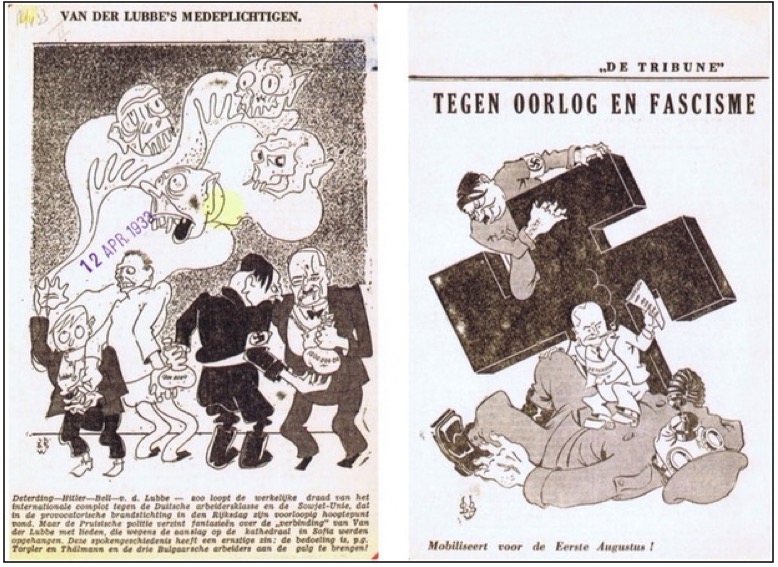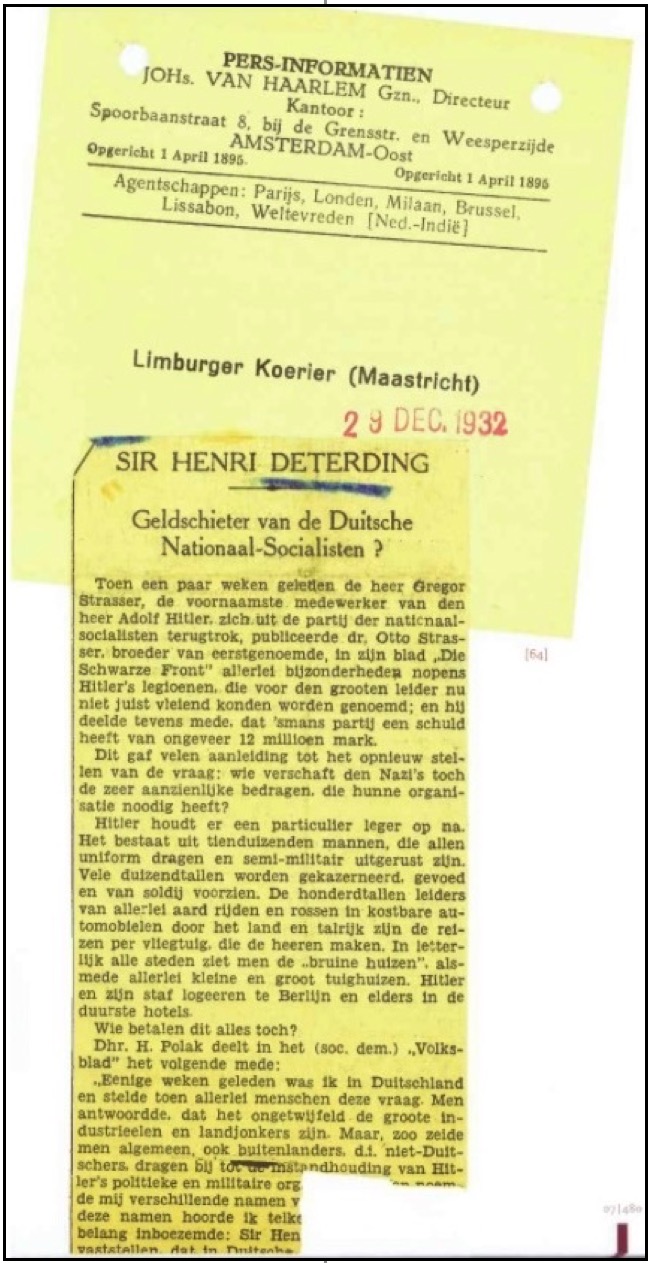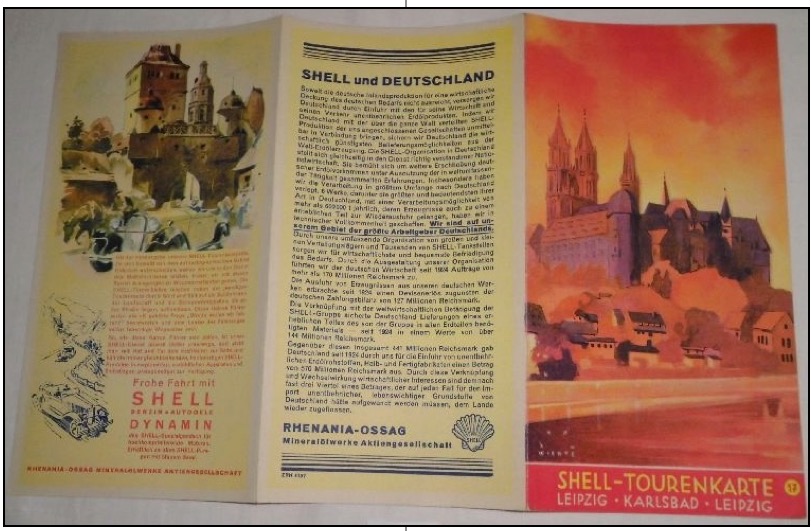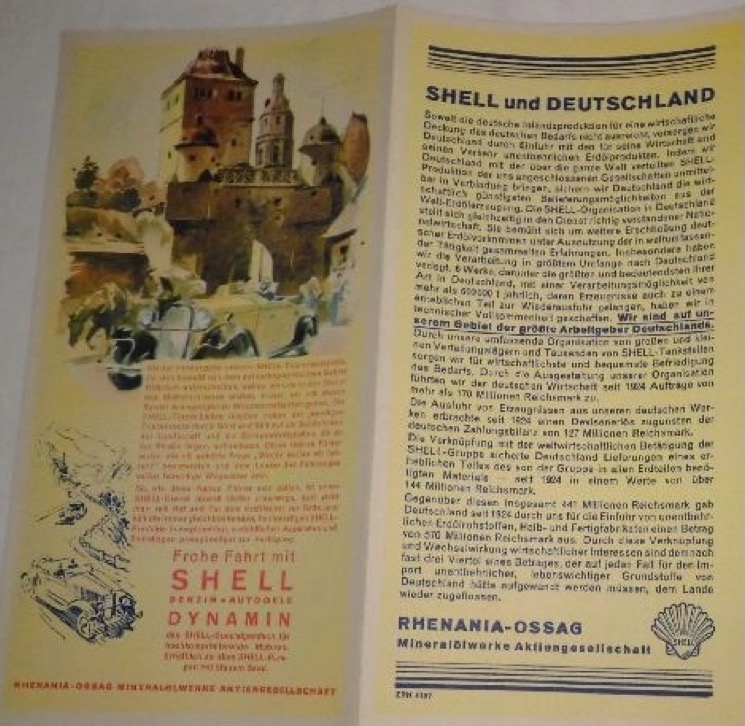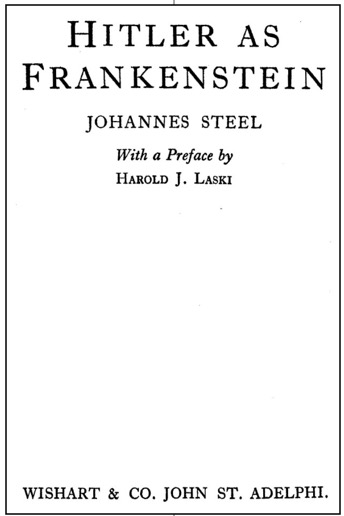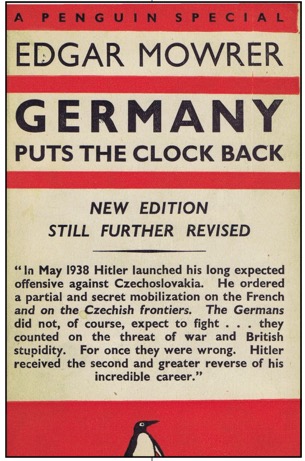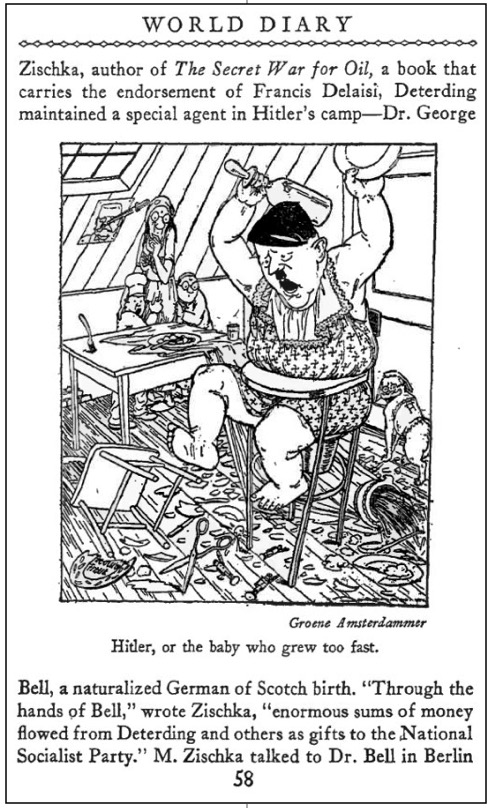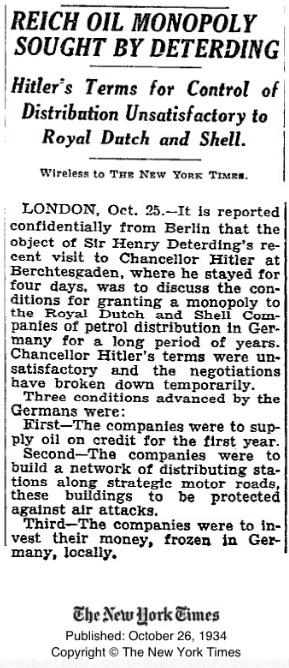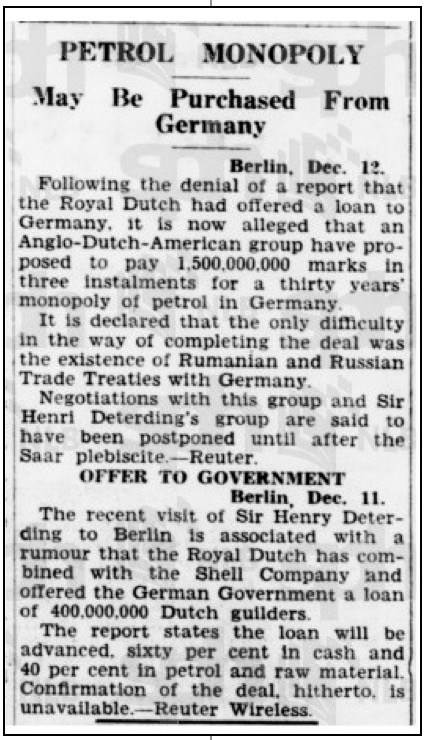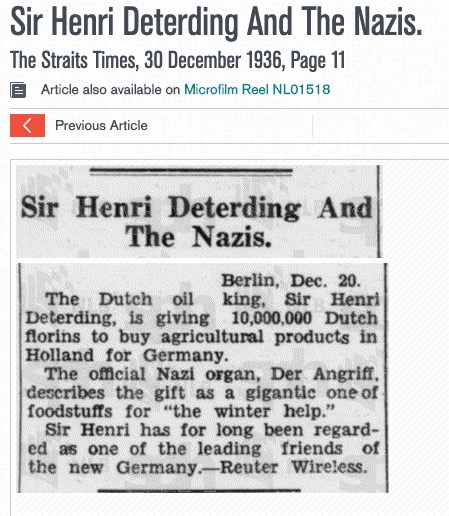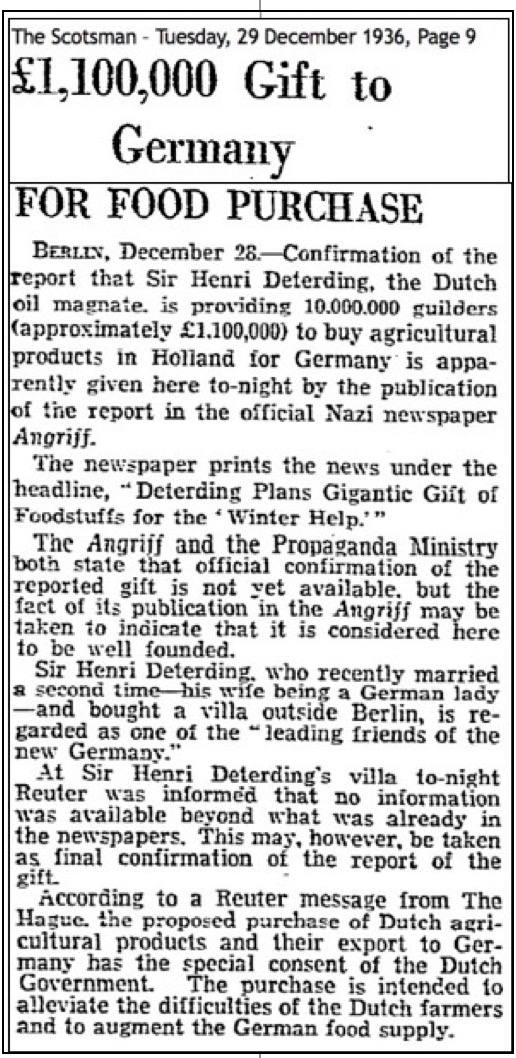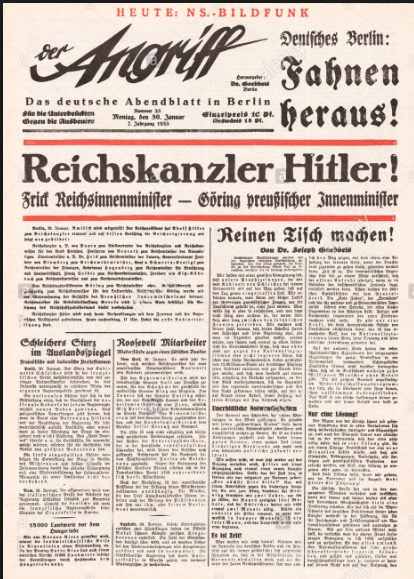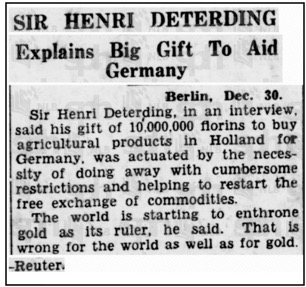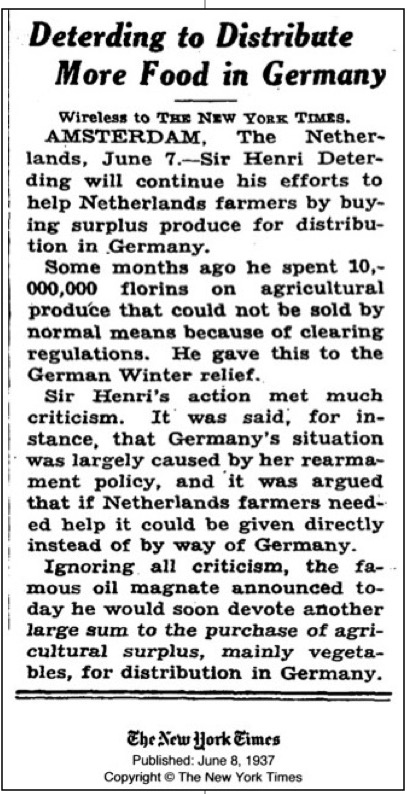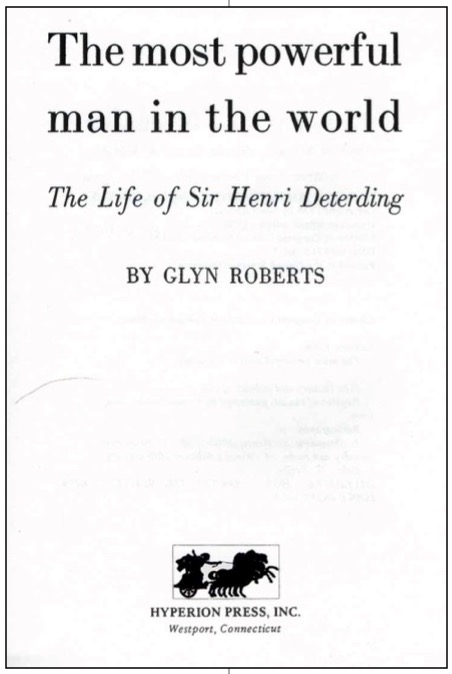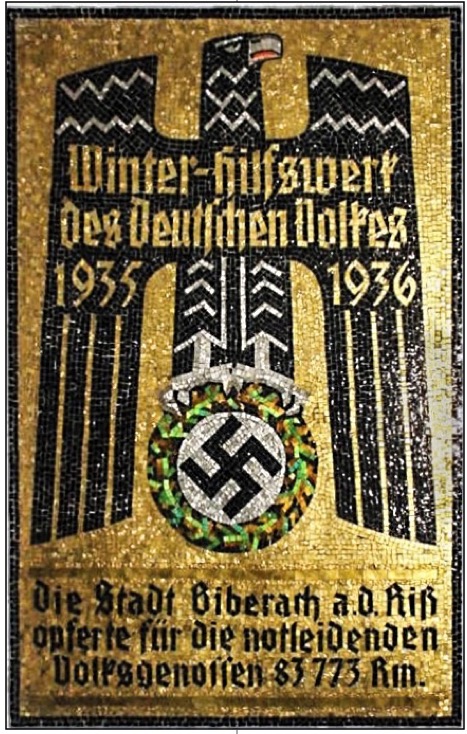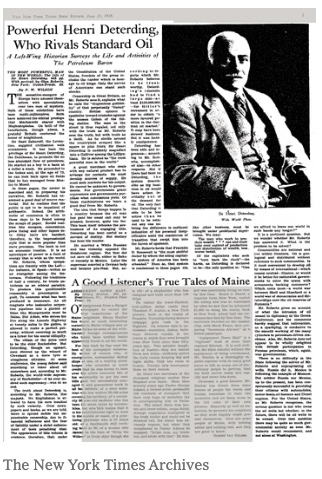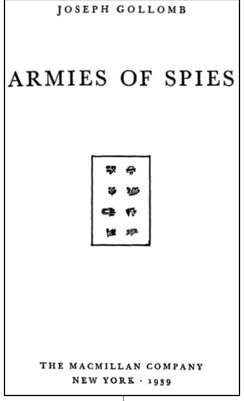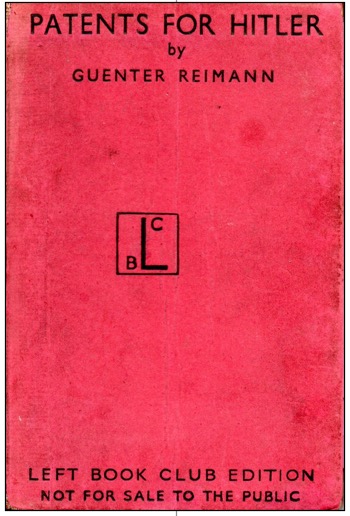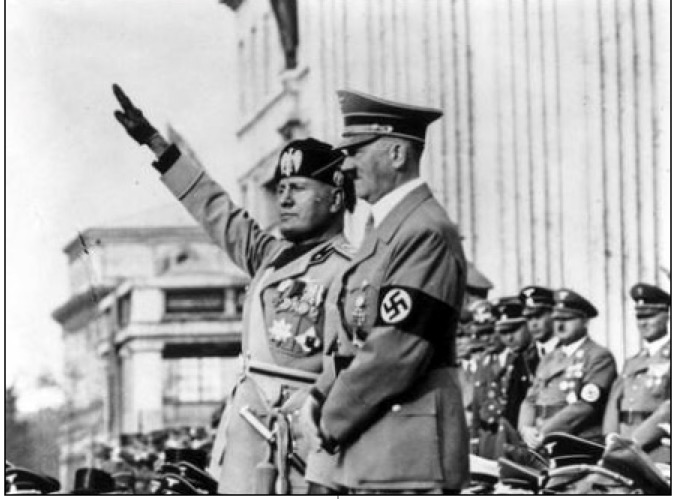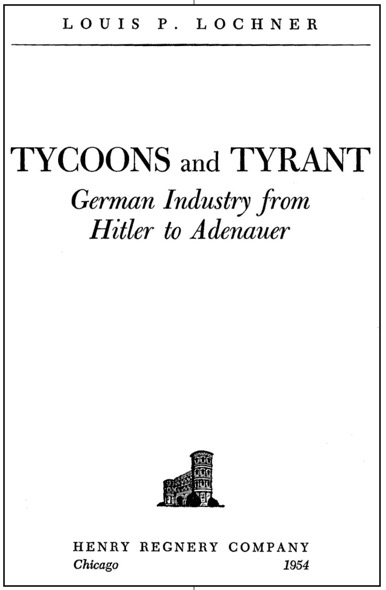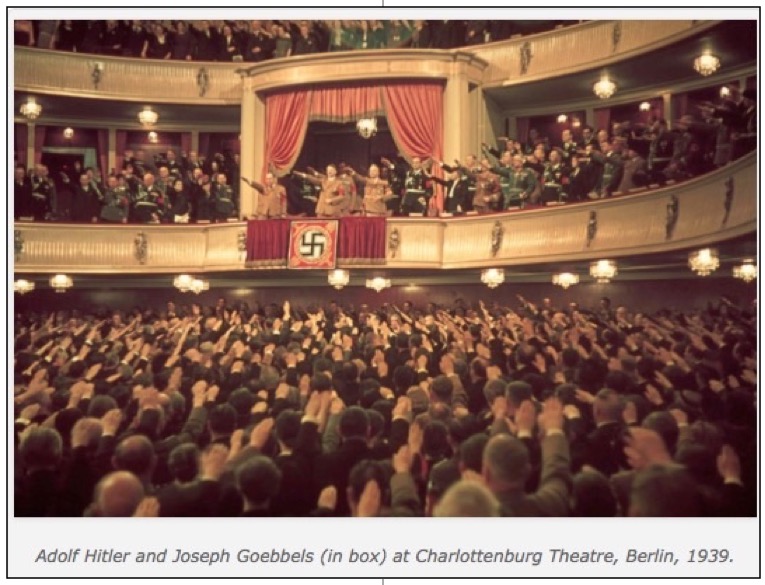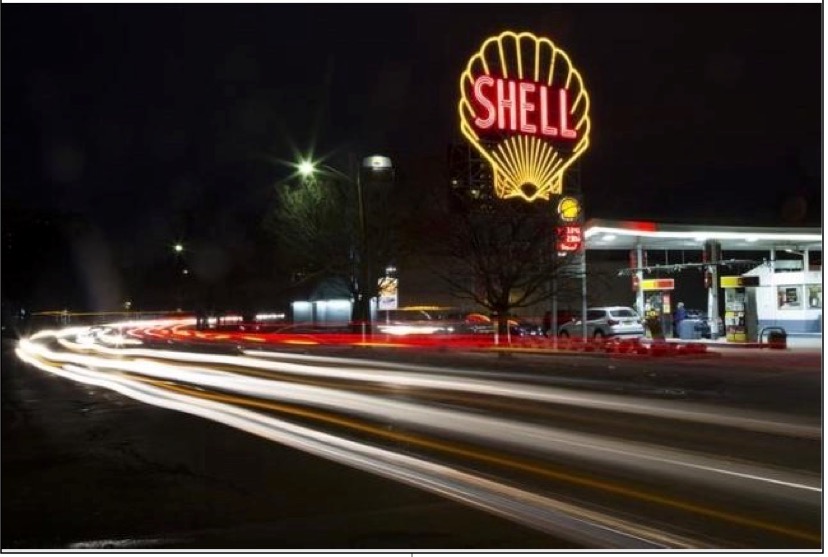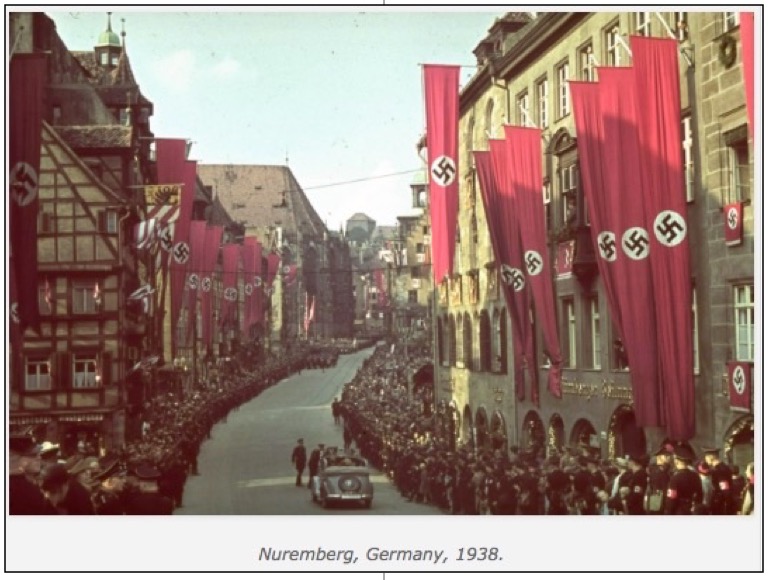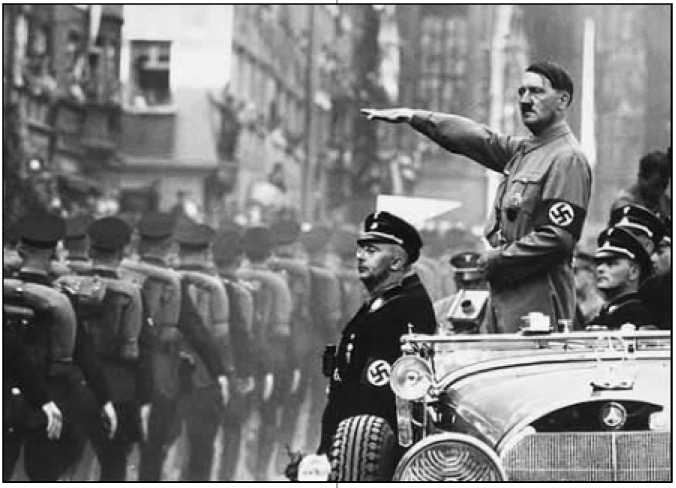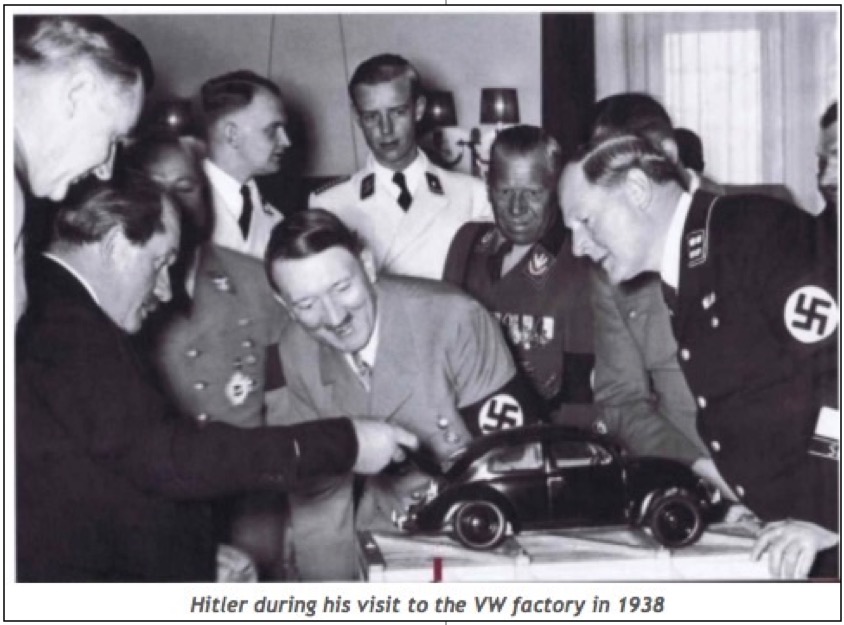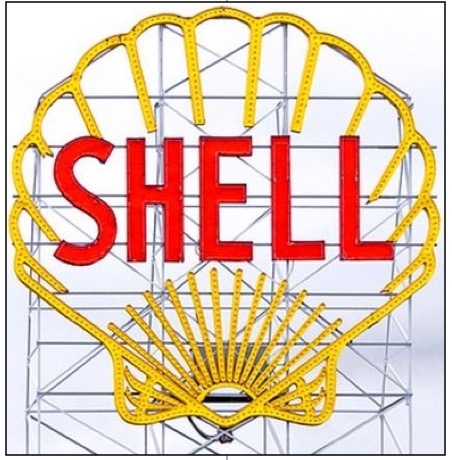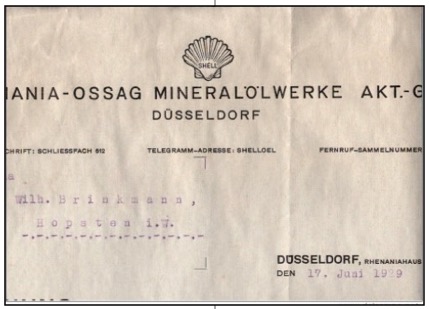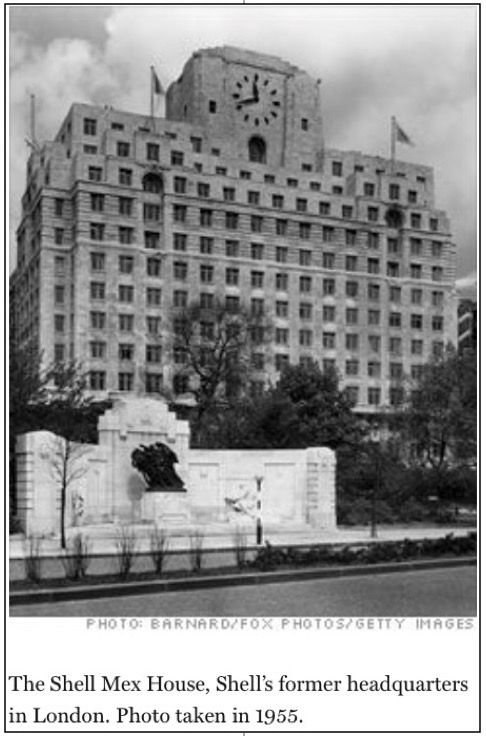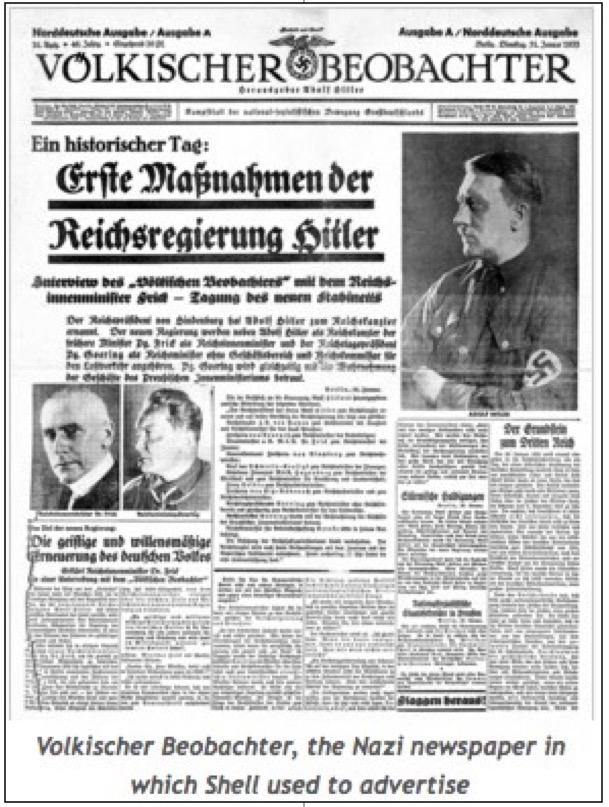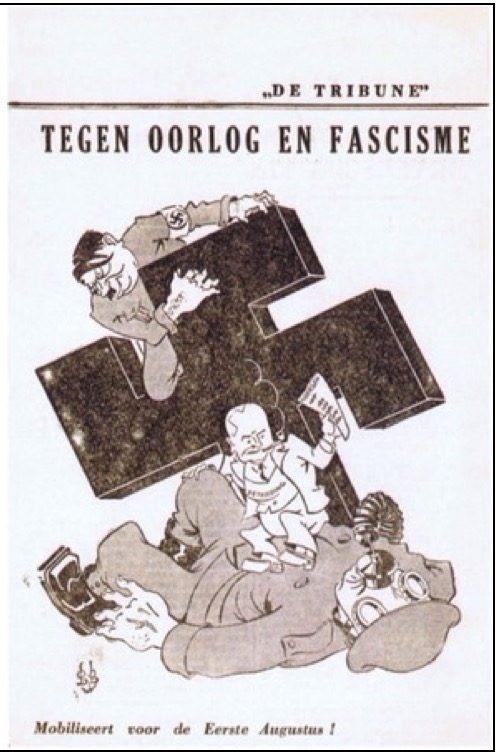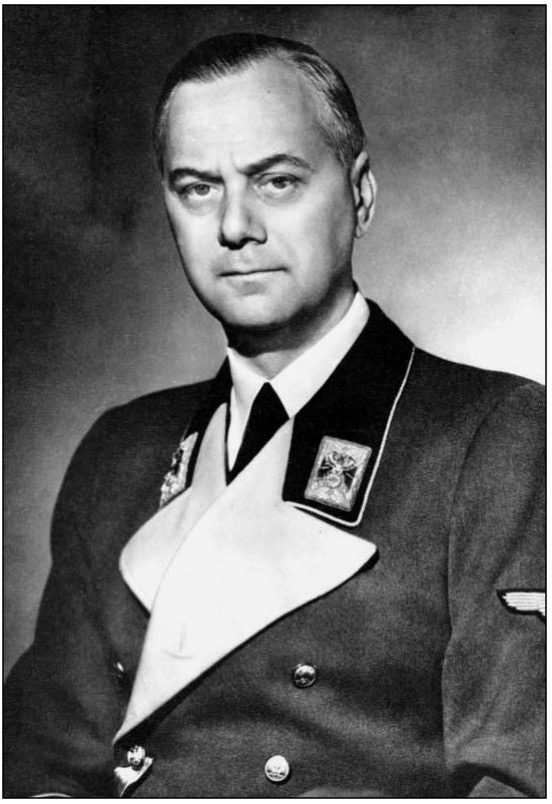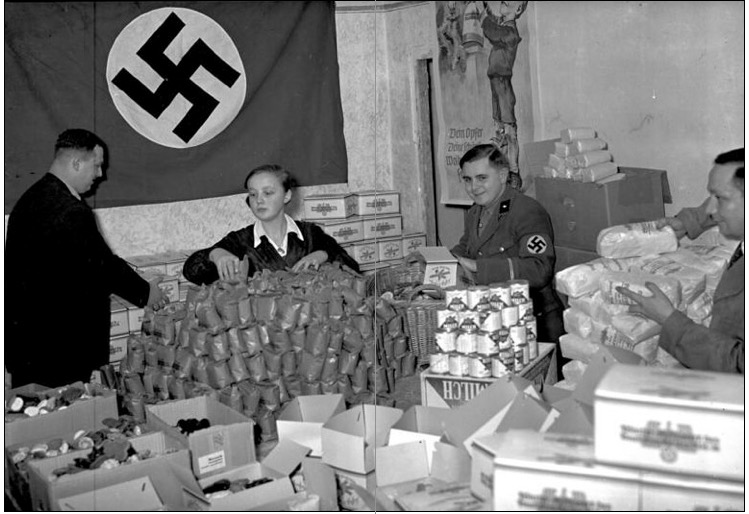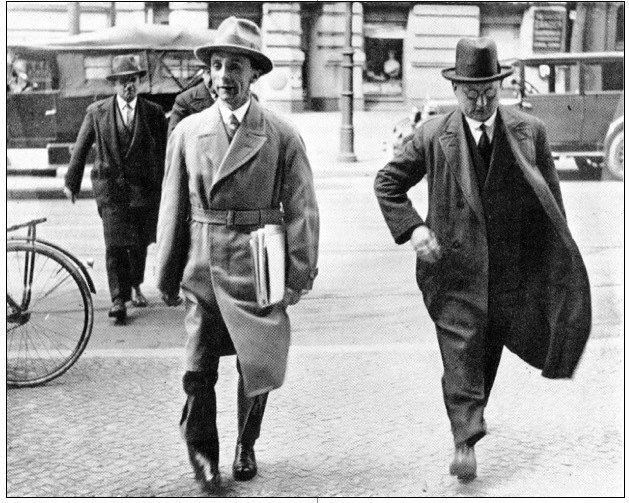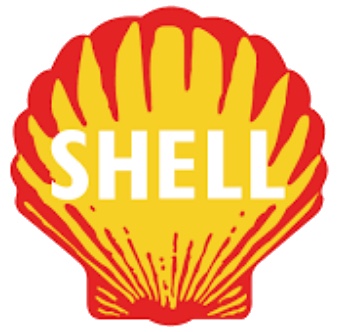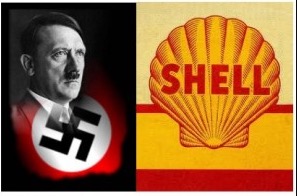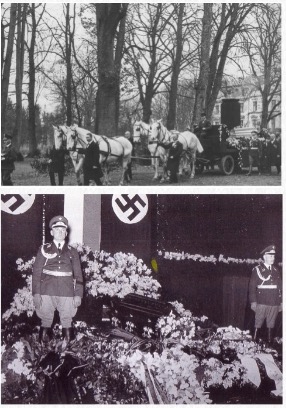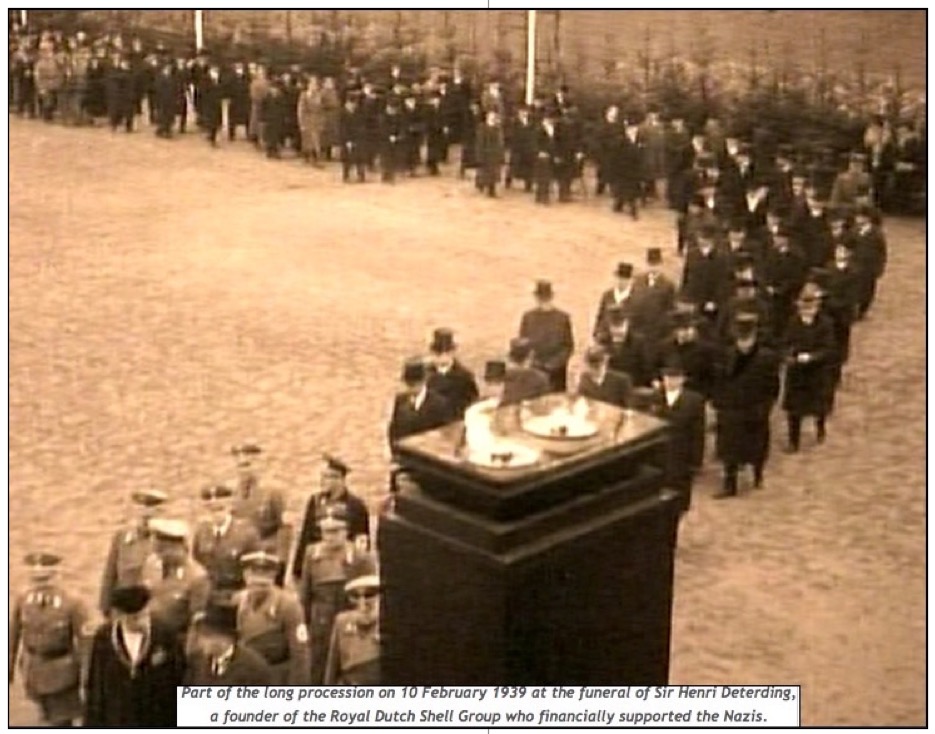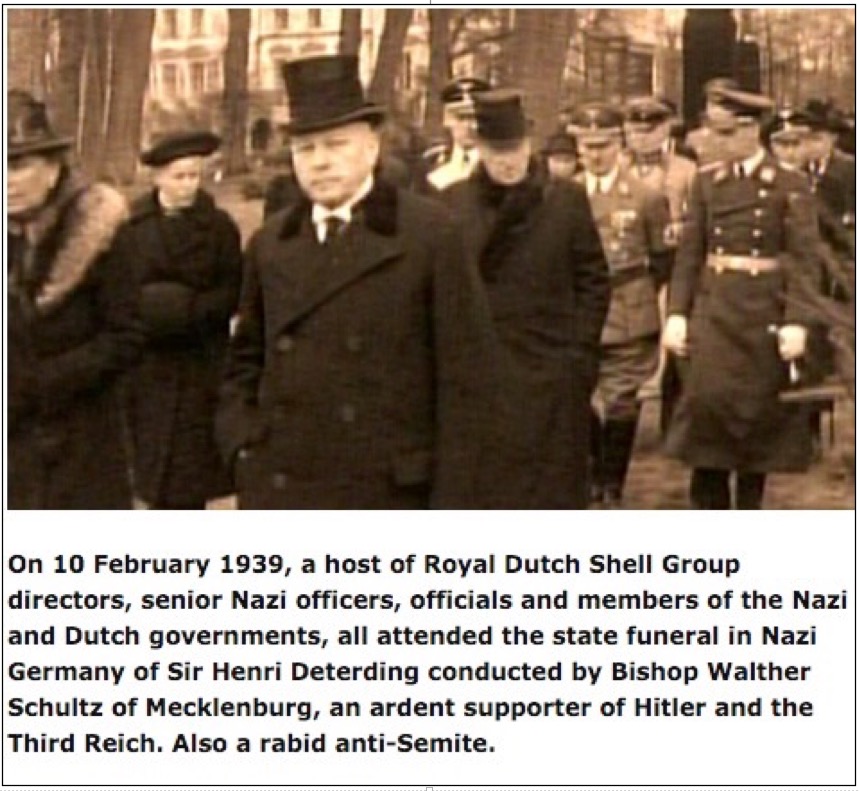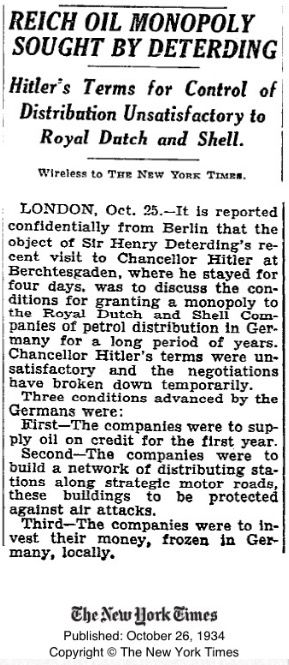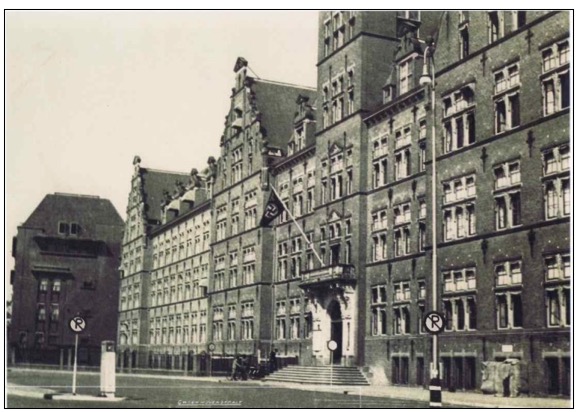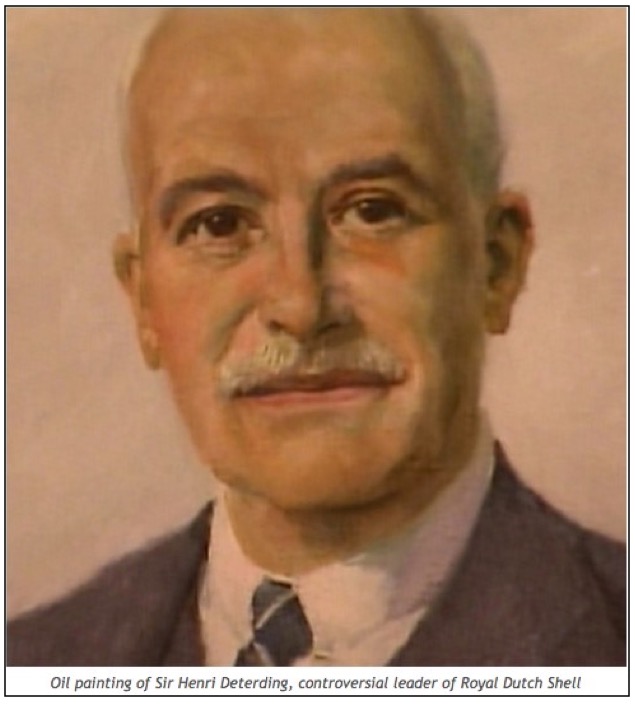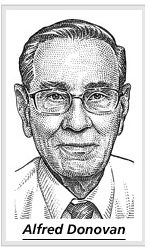Dutch cartoons provide evidence of a perception in pre-WW2 years that Sir Henri Deterding was a major financier of Hitler’s Nazi regime. Identified by name in both cartoons, Deterding is depicted handing over a bag of money to the Nazis containing a large sum – 1000 000 00 – in unspecified currency: see enlargements 1 and 2. Overwhelming evidence confirms that the perception was well founded.
Extracts from relevant news reports and books, many authored before WW2, are listed in date order, providing compelling evidence of what transpired all those years ago.
The overall information confirms the financial contribution Royal Dutch Shell leadership – which included Nazis, Nazi appeasers and pro-fascists, made to the Third Reich.
It was given in a variety of forms: investment; jobs; taxes; massive donations in cash and food; oil on long-term credit and revenues from Shell advertising in a Nazi newspaper, Völkischer Beobachter. The authors of RDSH V1 described the food donations in the following terms on pages 483 and 485:
“The grand gesture Deterding made after his retirement illustrates how he liked to use his money. In December 1936 he donated, with much fanfare, 10 million guilders from his personal fortune to set up a fund for buying up surplus foodstuffs in the Netherlands and selling them in Germany, purportedly to ease the plight of Dutch farmers and German consumers, equally hit by the trade barriers and exchange restrictions between the two countries. The proceeds of this deal would be donated to the Nazi charity Winterhilfswerk. This was really an ingenious scheme to avoid taxes and currency complications in transferring part of his capital to Germany.”
This information is not strictly correct. Sir Henri’s retirement as Director General of the Royal Dutch Shell Group did not take effect until 31 December 1936.
His controversial food donations to the German Winterhilfswerk (Winterhelp) scheme commenced just before, not after his retirement as DG.
Sir Henri was still DG of the Group when the initial massive donation of food to Nazi Germany was announced in a Reuter’s Wireless report dated 20 December 1936.
According to a news report quoted on page 324 of the Sir Henri Deterding biography ‘THE MOST POWERFUL MAN IN THE WORLD’, 7,000 railway wagons were needed to transport the donated food. Exact extract: “Seven thousand railway wagons were used in the first immense delivery.”
Despite criticism in the news media, specifically linking the money saved on food to Nazi rearmament, Deterding continued to donate Dutch food for Nazi Germany, where he now lived after marrying his secretary, a young German woman. The food donations allowed the Nazis to divert funds to building up military might.
Section “A” on page 14 of a Military Tribunal document arising from the War Crimes Trials at Nuremberg (dated 6 December 1947), had the heading: “Financial Support of Hitler and Nazi Party.” It mainly covered the funding given to the Nazi Party at a critical time by IG Farben. It states on page 14: “The financial support thus given by Farben along with other industrialists contributed to Hitler’s seizure and consolidation of power.”
On the same page, it makes direct reference to “…contributions to the winter aid scheme (Winterhilfswerk)…” as part of the “important contributions.”
That is official recognition of the importance of food donations to the Nazi Winter Aid Fund in supporting Hitler and his regime.
In reading the listed information in date order that follows, it seems proper to give extra credence to information published while the industrialist Sir Henri was still alive. He had the opportunity to challenge in court any incorrect statement or allegations about him.
All of his financial support for Hitler and the Nazi party took place while he was a director of multiple companies within the Royal Dutch Shell Group and retained a measure of control via preference shares. This included the period after he had retired as DG.
His Shell colleagues must have been well aware from all of the international publicity about the massive financial aid, yet Sir Henri remained as a director. Perhaps it also suited the Group because of its continuing relationship with the leadership of Nazi Germany, which had such a high regard for Deterding and his money. Sir Henri never retired from being a Shell director. Shell records prove that he was a Shell director until the day he died: 4 February 1939.
Chronological extracts from various publications, 1931 onwards:
1931
The Scotsman – Tuesday 27 January 1931
SIR HENRY DETERDING
Reported Benzine Monopoly Negotiations in Germany.
Berlin , January 26. — Sir Henry Deterding is arriving in Berlin to-morrow. It is rumoured that he is to undertake discussions connected with the establishment of a benzine monopoly, but concerning this well-informed opinion in oil circles is sceptical. It was stated at the Ministry of Finance to-day that the Ministry is without knowledge of the plan attributed to Sir Henry Deterding . The Reich Government continues to oppose the idea of a benzine monopoly. —Exchange.

1932
Evidence from Dutch Newspaper “Limburger Koerier.” as cited in red text on page 480 of RDSH V1: “This extract from the Limburger Koerier of 29 December 1932 was only one of the many articles in the national and international press speculating about who might be funding the Nazi party, which was deeply in debt. Deterding’s name came up more than once.”
The graphics show a cutting of the Limburger Koerier article and a related receipt/note with a date stamp of 29 December 1932.
The headlines state:
SIR HENRI DETERDING
Sponsor of the German National Socialists?
The article revealed that the Nazi party was 12 million marks in debt.
It listed examples of extravagant spending by Hitler and his private army, mentioning expensive houses, hotels, cars, horse riding and air travel. The article goes on to speculate who was funding it all. It makes reference to foreign great industrialists contributing to Hitler’s political and military organization.
The part substantiating the headline and sub-headline, which suggests exactly who was behind the funding, has been judiciously removed/censored by an unknown party just when the name “Sir Hen” appears.
A rough translation up to the point when the text in the small print gets to the name of Sir Hen
SIR HENRI DETERDING
Lender of the German National Socialists?
When a few weeks ago, Mr. Gregor Strasser, Mr. Adopf Hitler’s chief employee, withdrew from the National Socialist Party, Dr. Otto Strasser, brother of the former Dr., published in his magazine. details of Hitler’s legions, which could not be called voyaging for the great leader, and he also said that the Nazi party has a debt of about 12 million marks.
This gave many a reason to ask the question again: who will provide the Nazis with the very considerable amounts that their organization needs?
Hitler owns a private army. It consists of tens of thousands of men, all of whom wear uniforms and are semi-militarily equipped.
Many thousands are quenched, fed and sold. The hundreds of leaders of all kinds drive and roar through the country in expensive cars and numerous are the journeys by plane that the gentlemen make. In literally all seden one sees the “brown houses”, as well as all kinds of small and large garden houses. Hitler and his staff are staying in Berlin and elsewhere in the most expensive hotels.
Who pays for all this?
Mr. H. Polak participates in the (soc. Dem,)., Volkblad “the following:
., A few weeks ago I was in Germany and asked all kinds of people this question. It was answered that it is undoubtedly the great industrialists and junks. But, foreign men also generally said, i.e. non-Germans contribute to the maintenance of Hitler’s political and military organs…
The partly obliterated text suggests that the same names came up every time in response to the questions posed by Mr Polak. They included “Sir Hen”.
ENDS
A Dutch newspaper article published on 18 April 1932 said that both Lord Beaverbrook and Sir Henry Deterding “have in the last few years, on an ever increasing scale, placed resources at the disposal of the National Socialist movement in Germany.” (Translation)
A Dutch newspaper article published on 22 July 1932 stated: “Undeniably there are also foreign interests that benefit from Hitler coming to power. It is even mumbled that the national socialist movement is partly financed by Sir Henry Deterding. (Translation)
1933
On 30 January 1933, Adolf Hitler was appointed as Reich Chancellor.
Motorist Touring Maps
In 1933, after Hitler came to power, the Shell German subsidiary, Rhenania-Ossag, launched a series of motorist touring maps, which boasted about Shell’s input into the German economy i.e. into the coffers of the Hitler/Nazi regime.
Extract from the text:
Die SHELL-Organisation in Deutschland stellt sich gleichzeitig in den Dienst richtig verstandener Nationalwirtschaft. Sie bemuht sich um weitere ErschlieBung deutscher Erdölvorkommen unter Ausnutzung der in weltumfassender Tatigkeit gesammelten Erfahrungen
Translated, it means that the Shell organization in Germany was utilizing its global experience to support the German national economy. An example map is displayed on page 470 of RDSH V1. The header in red text above the map states:
“Late in 1933 Rhenania set up an information office for motorist and launched a large series of motorists’ touring maps, emphasizing – despite some political doubts from The Hague – the importance of Shell as a contributor to the German economy.”
Shell boasted about its contribution to the German economy stretching back to 1924. The relevant text on the section headed “SHELL und DEUTSCHLAND” contains a series of claims e.g. Shell had created technical perfection at its refineries in Germany and was the largest oil industry employer in the country. Shell claimed that the German economy had received 170 million Reichsmarks from the Shell Group.
Other sums involving over a billion Reichsmarks are listed. The overriding message was that Germany was benefitting financially from its link with Shell. An English language translation can be read here.
It is fair to say under the circumstances that Shell was also a great friend of the Germans.
I assume the maps provided precise directions to the Polish border.
There are several references within this book to Johannes Steel, with extracts from his writings. He authored the book “Hitler As Frankenstein” published by Wishart & Co in 1933.
According to Wikipedia, Johannes Steel was the son of a German-Dutch landowner.
When the Nazis took power in Germany, he fled to the USA and initially got a job as a journalist working for the New York Post. Because of his foresight, which included predicting WW2, he later became a successful radio commentator in America.
Extracts from his book, “Hitler As Frankenstein:”
From page 22
Finance is Adolf Hitler’s personal prerogative. Funds are centralised under his direction and he is virtually the only person who can authorise disbursements. It is no concern of the mass of the brown shirts, in the view of their leader, to know where the money comes from or how it is spent.
From pages 88 & 89
Dr. George Bell was present at several of these conferences as a delegate of Hitler and Deterding jointly. For Dr. Rosenberg, who at that time had been just two years naturalised in Germany, had become Hitler’s expert in foreign affairs, and he had advised Deterding, through the medium of Dr. George Bell, who brought about the contact, as to the attitude the Hitlerites would take in regard to the question of the Polish Corridor and the Soviet Ukraine, where there are rich supplies of oil. Rosenberg suggested to Deterding, through Bell, that at an appropriate moment unrest should be fostered in the Ukraine, and an attempt be made with the aid of Germany to wrest the Soviet Ukraine away from the Soviet Union and give it back to Poland, to whom it had belonged at the time of the ancient Polish kingdom. Germany in return should receive the Corridor back, so satisfying the Hitlerites’ nationalistic ambitions, and Sir Henri Deterding should be rewarded with mineral concessions for his efforts to persuade responsible British quarters to give tacit support to such an undertaking.
Anyway, from the day of the Ukrainian Conference, Deterding has been supporting Hitler with considerable sums of money (which found their way into the Hitler exchequer through Dr. Bell), hoping that in case the Hitlerites should come into power, they would pursue at any rate an anti-Soviet policy.
On 17 April 1933, Time Magazine published an article “GERMANY: Co-ordination“.
Extract
Dr. Bell was, with the notorious Count de Moulin Eckhardt, one of the intimates of the perverted Storm Troop Leader Capt. Ernst Roehm (TIME, March 20). While still in Nazi good graces he went to London” called according to rumor by Sir Henri Deterding who was currying favor with Adolf Hitler in the hope of winning oil contracts for Royal Dutch-Shell.
On 1, December 1933, an American newspaper in Wisconsin, The Stevens Point Daily Journal, published an article under the headline: “Ex-Nazi Member ‘Opens” Mystery of Hitler Finances.”
It contained reference to the Steel book, “Hitler as Frankenstein”:
Extract
The book “Hitler as Frankenstein,” recently published by Wisbart & Co., and written by Johannes Steel, a former member of the nazi movement, although apparently not in the uniformed branch, contains some extraordinary facts about nazi financing – if facts they are. If they are not, they ought to be proven untrue by those against whom the charges are made.
Great Britain is listed in the book as one of the most productive fields for the hitlerites’ money-collecting activities. The main contributor appears to have been Sir Henri Deterding, the untiring advocate and organizer of foreign action against Soviet Russia. The nazi emissary Alfred Rosenberg persuaded him that the nazis would help him to important concessions in Ukraine.
The following is a direct extract from a book by Edgar Ansell Mower “Germany Puts The Clock Back” first published in 1933 by Penguin Books Limited.
From page 114
Sir Henry Deterding was accused by unfriendly Germans of having put up a considerable sum for the 1932 presidential campaign in the hope (or on the promise?) of being granted an oil monopoly in the ‘Third Empire’.
1934
The Scotsman – Saturday 18 August 1934



THE WORLD’S OIL
Sir Henri Deterding Says More Consumers Needed
PRICES ARE TOO LOW
“MORNING POST” AND “THE SCOTSMAN”
CORRESPONDENT
New York, August 17 . —Sir Henri Deterding sees little hope for the world’s petroleum industry while the United States is still deluged with so-called “hot oil,” that is produced illegally in violation of curtailment agreements.
Arriving on the Berengaria to confer with Mr Walter C. Teagel, president of the Standard Oil Company of New Jersey , Sir Henri Deterding expressed the belief that “the oil industry is trying to overproduce at an outrageously low figure . He sees “little hope of improving the condition” until you-first put your house in order, ” remarking ” 35 cents is the present price, when it might well be a dollar a barrel. The thing we should do is to work for more consumers. In America there is too much taking of business from one company by another. It is worse here than any where else in the world.”
DIESEL V. ELECTRICITY
He admitted that the tendency towards motorised steamships and Diesel-driven locomotives was an important factor in broadening the oil market , and expressed the belief that Diesel power would replace electricity on the railroads , especially on longer hauls, explaining, ” With electricity , if the power plant breaks down nothing moves, but with Diesel power the railways are absolutely independent. ” Admitting this was hard on coal producers, he held that it might be offset by transforming coal into energy at the source, pointing out, “The minute you begin transporting coal you begin losing money.”
THE IRAQ FIELDS
Asked if the Iraq fields would eliminate the U. S. as the principal factor in the world oil market . Sir Henri shrugged his shoulders and said, “Americans are there also, and much that you hear about Iraq is political.” He declined to go into the subject of the conferences with Mr Teagle, simply saying, “When two oil men get together there is always plenty to talk about.” He sees little use in another world conference under prevailing conditions.
In 1934, Johannes Steel published a further book, “The Second World War”
Extract from page 99
…had been advocating foreign action against the U.S.S.R., saw great possibilities in this plan and from that day on Deterding supplied the Nazis with money. This money was transmitted by Dr. Bell, who was murdered by Storm Troopers in March 1933, when he tried to sever his connection with the Nazis.
On 8 November 1934, an American newspaper in New Brunswick NJ, The Daily Gleaner, published installment four of a serialization of the Steel book, “The Second World War.”
Extract
Nazi foreign policy as a whole is based upon the plans of Alfred Rosenberg now the head of the Foreign Office of the National Socialist Party. As far back as 1926, Rosenberg through his secretary, Dr George Bell, a Scotchman naturalised in Germany, established contact with Sir Henri Deterding, the British oil magnate. He informed Sir Henri of the foreign political programme which the National Socialists intended to pursue when they achieved power. Sir Henri, as well as the directors of the Lena Goldfield, who for a long time had been advocating foreign action against the U.S.S.R., saw great possibility in this plan, and from that day on Deterding supplied the Nazis with money.
The World Diary by Quincy Howe, first published in 1934, contains information confirming that Deterding contributed to Hitler’s campaign funds. It also confirmed the role played in such transactions by Dr. George Bell.
The publication contains nearly 400 pages and although the pdf file is condensed, still takes a few minutes to load. Also, note that many pages are blank, including the first four.
Extracts from pages 57, 58 & 59
While British industrialists were fighting against the same group of German industrialists whom Thyssen also opposed, the foremost British oil magnate gave funds to Hitler. His eyes, however, were on Russia rather than Europe. Sir Henri Deterding, director general of the Royal Dutch-Shell Oil Company, had married a White Russian wife and had lost valuable oil properties in Russia at the hands of the Bolsheviks. According to Antoine Zischka, author of The Secret War for Oil, a book that carries the endorsement of Francis Delaisi, Deterding maintained a special agent in Hitler’s camp-Dr. George Bell, a naturalized German of Scotch birth. “Through the hands of Bell,” wrote Zischka, “enormous sums of money flowed from Deterding and others as gifts to the National Socialist Party.” M. Zischka talked to Dr. Bell in Berlin in 1932 after Deterding had withdrawn his support because he had become “a little worried about Hitler’s Socialist tendencies.” Up to that time, however, Deterding gave money to the Hitlerites, all that his agent Bell asked for.”
What did the Nazis have to offer Deterding? Hitler’s autobiography contains a passage that advocates attacking the Soviet Union, prying the Ukraine loose from Communist rule, and setting it up as a republic, financed and exploited by Germany. Alfred Rosenberg, Hitler’s chief adviser on foreign policy, had worked out the same scheme in greater detail in the plan that bears his name, and Deterding’ s persistent hostility to Russia made the Nazis his natural allies.
Page 334
The fact that Deterding had contributed to Hitler’s campaign funds accounted for his high opinion of Fascism as an aid to the industrialist And his approval of Roosevelt’s attacks on the money changers provided still further evidence that the New Deal merely marked the rise of the industrial magnate and the fall of the financial magnate.
On 26 October 1934, Reuters reported a four-day meeting between Deterding and Hitler to discuss a deal giving Royal Dutch Shell a monopoly for petrol distribution in Germany. During the course of the four days, obviously, a lot more matters of mutual interest were discussed.
Discussions about a Shell petrol monopoly in Germany were still in progress in mid-December 1934.
Extracts from Reuters reports published by The Singapore Press and Mercantile Advertiser on 15 December 1934:
PETROL MONOPOLY
May be purchased from Germany
Berlin. Dec. 12.
Following the denial of a report that the Royal Dutch had offered a loan to Germany, it is now alleged that an Anglo-Dutch-American group have proposed to pay 1,500,000,000 marks in three instalments for a thirty years monopoly of petrol in Germany.
Berlin, Dec 11.
The recent visit of Sir Henry Deterding to Berlin is associated with a rumour that the Royal Dutch has combined with the Shell Company and offered the German Government a loan of 400,000,000 Dutch guilders.
1935
Extract from page 4 of The Port Arthur News published 13 January 1935:
Berlin insiders say that Sir Henry Deterding, of the Shell Oil combine, was in the capital incognito recently and offered the German government a 250 million dollar credit for oil purchases, over several years. The news leaked out and both the Dutch and the British governments have sat on the scheme—hard. It goes to show what the wily Anglo-Dutchman and his friends think of the dangers of the I.G. Farben engineers experimenting further with synthetic gas.
Extracts from The Titusville (PA.) Herald published 11 February 1935:
Rumors have circulated repeatedly during past months that Sir Henri Deterding, president of the Dutch company, is angling for a slice in the proposed monopoly. “Although great secrecy obtains,” said an official of questioned authority today, “it seems obvious that Deterding tried to come to some agreement concerning the position of Shell oil in Germany during his visit here this week.”
Information from the Meriden Record published 13 September 1935:
Sir Henri is described in the article as the “strong man of the billion dollar Royal Dutch Shell corporation…” and was said to enjoy a monopoly in the Nazi state.
1936
The Scotsman – Wednesday 03 June 1936

SIR HENRI DETERDING
70-Year-Old Oil Magnate Married for Third Time
Amsterdam, June 2 . —The wedding of Sir Henri Deterding, the 70 year-old oil magnate, and Fraulein Charlotte ‘ . Minna Knaack took place in the strictest privacy at the Amsterdam Town Hall to-day. Fraulein Knaack is 39 years of age.
The Mayor of Amsterdam M . de Vlugt, officiated at the ceremony. The couple left immediately after the wedding by aeroplane for Berlin.
This is Sir Henri Deterding’s third marriage. His second marriage, to Lydia Pavlovna Koudoyaroff, daughter of the late General Paul Koudoyaroff, was Dissolved only a fortnight ago.
The Scotsman – Saturday 24 October 1936

 SIR HENRI DETERDING
SIR HENRI DETERDING
Reported Intention to Resign from Royal Dutch Company
The Hague , October 23 . —Sir Henri Deterding, the oil magnate, will, it is understood, resign from his position as Director-General of the Royal Dutch Petroleum Company at the end of the year.
He will be succeeded by Dr de Kok, Director at the Hague, who will continue to have his headquarters here.
Dr Van Eck, vice-chairman of the Board of Directors of the Shell Union Oil Corporation in America, will be appointed the managing director in London, and Mr J . M. de Booy as managing director at The Hague . —Reuter .
Reports of Sir Henri donating millions of dollars worth of food to Germany:
The Straits Times, 30 December 1936, page 11: (Publication of a Reuters report dated ten days earlier – 20 December 1936:
Extract
Sir Henri Deterding And The Nazis.
Berlin, Dec. 20.
The Dutch oil king, Sir Henri Deterding, is giving 10,000,000 Dutch florins to buy agricultural products in Holland for Germany.
The official Nazi organ, Der Angriff, describes the gift as a gigantic one of foodstuffs for “the winter help.”
Sir Henri has long been regarded as one of the leading friends of the new Germany.–Reuters Wireless.
Translated extracts from an article published in Dutch by The Nation: State and Literary Newspaper: 28 December 1936:
Sir Henri Deterding and Dutch agriculture Purchase for Germany
Following reports in the press, be informed that Sir Henri Deterding, concerned with the difficulties, which finds the Dutch agriculture and impressed by the objections that the food in Germany reveals has decided outside the Netherlands German-clearing to, funds amounting to some millions of dollars available for the purchase of Dutch agricultural products which will go to Germany…
The Scotsman: £1,100,000 Gift to Germany FOR FOOD PURCHASE: 29 December 1936:
(See featured center article)
TEXT
The Scotsman – Tuesday, 29 December 1936, Page 9.
£1,100,000 Gift to Germany
FOR FOOD PURCHASEBerlin, December 28.–Confirmation of the report that Sir Henri Deterding, the Dutch oil magnate, is providing 10,000,000 guilders (approximately £1,100,000) to buy agricultural products in Holland for Germany is apparently given here to-night by the publication of the report in the official Nazi newspaper Angriff.
The newspaper prints the news under the headline, “Deterding Plans Gigantic Gift of Foodstuffs for the ‘Winter Help.””
The Angriff and the Propaganda Ministry both state that official confirmation of the reported gift is not yet available, but the fact of its publication in the Angriff may be taken to indicate that it is considered here to be well founded.
Sir Henri Deterding, who recently married a second time-his wife being a German lady-and bought a villa outside Berlin, is regarded as one of the “leading friends of the new German.”
At Sir Henri Deterding’s villa tonight, Reuter was informed that no information was available beyond what was already in the newspapers. This may, however, be taken as final confirmation of the report of the gift.
According to a Reuter message from The Hague, the proposed purchase of Dutch agricultural products and their export to Germany has the special consent of the Dutch Government. The purchase is intended to alleviate the difficulties of the Dutch farmers and to augment the German food supply.
ENDS (See example of The Angriff Nazi newspaper below:
The Manchester Guardian: £1,000,000 TO BUY FOOD: Helping Germany: SIR H. DETERDING PROVIDES MONEY: Tuesday 29 December 1936:
Extract
£1,000.000 TO BUY FOOD
Helping Germany
SIR H. DETERDING PROVIDES MONEY
The Guardian article quotes from a report published in the official Nazi newspaper “Angriff,” under the headline: “Deterding Plans Gigantic Gift of Foodstuff for the “Winter Help.”
The Advertiser (Adelaide, SA) Wednesday 30 December 1936: Page 11:
UNEXPECTED AID FOR GERMANY
£1,000.000 Purchase Of Dutch Produce
THE HAGUE. December 28.
With a view to assisting Dutch farmers, Sir Henri Deterding, Director-General of the Royal Dutch Petroleum Co., has given £1,000.000 to purchase produce for export to Germany. The gift is said not to be concerned with politics. Sir Henri Deterding married a German, Fraulein Knaack, in June last year, and at present lives outside Berlin. His object is, as a Dutchman, to help both countries. He proposes to buy up vegetables and meat, unsaleable owing to over-production. The Dutch Government has agreed to issue special export licences.
THE TIMES: “DUTCH HELP FOR GERMANY”: 30 December 1936:
Extract
Sir Henri Deterding has drawn up a scheme by which the entire surplus of Dutch agricultural products is to be bought and transported to Germany. There it will be sold in marks and the revenue will be handed over to the German Winter Help organization.
(A Nazi Organization)
SAN ANTONIO EXPRESS: DUTCH SHELL HEAD TO BUY DUTCH FARM PRODUCTS FOR GERMANY: Wednesday 30 December 1936:
Extracts
DUTCH SHELL HEAD TO BUY DUTCH FARM PRODUCTS FOR GERMANY
The rise of a new agrarian party in the Netherlands, dominated by Sir Henri Deterding, may result from the oil magnate’s large-scale purchases of Dutch farm products for Germany, officials here said today.
Another result may be preferential treatment for Sir Henri’s oil interests in a grateful Germany, these authorities indicated.
Sir Henri, chairman of the Royal Dutch Petroleum Company, a Hollander recently married to a German woman, yesterday announced he was making available 10,000,000 guilders (about $5,400,000) to buy products of Dutch farms – which have had a hard time finding markets- for shipment to Germany, where shortage of foodstuffs is a serious problem.
The Argus (Melbourne) Wednesday 30 December 1936 Page 1:
Extract
With the object of assisting Dutch farmers, Sir Henri Deterding has given £1,000,000 for the purchase of farm products for export to Germany.
The Advertiser (Adelaide, SA Thursday 31 December 1936 Page 17: Complete Article:
Extracts
DUTCHMAN’S GIFT TO GERMANY
Communism And Trade Barriers Aimed At
Australian Associated Pres.
THE HAGUE, December 29.
Indicating that his gift of £1,000,000 to purchase produce for export to Germany was aimed to circumvent economic restrictions and communism.
Version published 31 December 1936 on page 10 of The Sydney Morning Herald:
Extracts
SIR HENRI DETERDING’S CAMPAIGN.
Reason for £1,000,000 Gift. LONDON, Dec. 30.
Sir Henri Deterding, director-general of the Royal Dutch Petroleum Company, and a director of the Shell Transport and Trading Co., Ltd., who has given £1,000,000 for the purchase of Dutch produce for export to Germany, apparently intends the gift as part of the campaign against economic restrictions and Communism. “The main object of the Communists is to prevent co-operation between the nations,” he says. “They therefore started to create trouble in Spain six years ago, and the result is now visible. “Britain can be thanked for her policy of non-intervention, which has prevented greater trouble among other Powers, whose further co-operation will be the quickest remedy against infectious Communism.”
Reviewing the economic conditions of Holland, Sir Henri Deterding expressed the opinion that the only solution was the diversion of the surplus products to a country where they were wanted. Restriction on trade between Germany and Holland could then be safely cancelled.
A new institute has been founded n Harlem, by which a periodical will be issued under the editorship of Dr Dyt, the administrator of Sir Henri Deterding’s large estates in Mecklenburg (Germany).
Reuters report published on page 1 of The Singapore Free Press and Mercantile Advertiser on 31 December 1936:
SIR HENRI DETERDING
EXPLAINS BIG GIFT TO AID GERMANY
Sir Henri Deterding, in an interview, said his gift of 10,000,000 florins to buy agricultural products in Holland for Germany, was actuated by the necessity of doing away with cumbersome restrictions and helping to restart the free exchange of commodities.
The world is starting to enthrone gold as its ruler, he said. That is wrong for the world as well as for gold. Reuter
Extract from a New York Times article published 31 December 1936 under the headline “DETERDING AIDS REICH AS WAY TO BAR REDS”:
Wireless to THE NEW YORK TIMES
AMSTERDAM. The Netherlands.
Dec. 30.–In a statement appearing in the leading newspapers here, Sir Henri Deterding, chairman of the Royal Dutch Petroleum Company explains his plan to purchase about 10,000,000 guilders’ worth of Netherland cattle and agricultural products for the German food supply.
From the book “Hitler, Volume 1” by Konrad Heiden: Publisher Eugen Prager, 1936 – Biography & Autobiography – 388 pages (Search for book title in Evidence File index):
Extract from page 224
They showed such exact knowledge that the agency of wire-pullers was immediately suspected, until in 1929 Hitler positively denied any financial connection with the East-Elbe Brown Coal Syndicate. On the other hand, financial connections with Sir Henry Deterding, head of the Koninklijke Shell-Oil concern, owner of Russian oil wells confiscated by the Bolsheviks, and the main instigator of the anti-Bolshevik campaign, were never denied either directly or indirectly.
Extract from The Aryan Path, Volume 7, Issue 6: Indian Institute of World Culture: Theosophy Co (India) Ltd 1936 (Search for the book title in Evidence File index):
Extract from page 262
Deterding, Director General of Royal Dutch Shell, gave funds to the Hitler movement and even French munitions makers contributed to Hitler’s war chest.
1937
Time.com: “GERMANY: Petticoat Philanthropy?” Monday, Jan 11, 1937:
Extract
Sir Henri, who was knighted by King George V in 1920, has for many years had his chief residence in London’s swank Mayfair, but last week he was sitting in his new house near the German capital and showed signs of developing into a good Berliner. His big Germanic gesture as 1937 opened was to place 10,000,000 Dutch guilders ($5.475,000) at the disposal of Dutch farmers…
Entry in the diary of Dr Joseph Goebbels made on 12 January 1937 (Search for his name in Evidence File index):
(Elke Fröhlich: The Diaries of Joseph Goebbels, all fragments, Munich, New York, London, Paris 1987, Part 1, Volume 3, p. 8)
“Hilgenfeld says WHW Deterding has donated 40 million.”
This was a reference to a 40 million Reichsmark donation made by Deterding to the German Winter Help Work aka Winters Fund – a food donation scheme known by the acronym “WHW”. Part of the funds received were diverted by Goebbels for other purposes e.g. to build a giant factory for Volkswagen, which built military vehicles.
Related extracts from translated Wikipedia article
(pdf version of translated Wikipedia article downloaded 6 Aug 2020: (See the last item on page 2 under “Financial support for National Socialism” and item 9 under “Individual records”)
Related extract from an article by Dutch historian Marcel Metze in an article published in October 2005 by “Historical NewsPaper” under the headline: “The Napoleon of oil: Henri Deterding (1866-1939)”:
“On January 13, 1936, Joseph Goebbels, Hitler’s Minister for Propaganda, noted in his diary that Deterding had made 30 million marks available for the construction of a factory for Volkswagen:”
(Note the different sum quoted – 30 million instead of 40 million)
The section on Joseph Goebbels Diary Ends
Extracts from a translated Wikipedia article (downloaded on 15 January 2016) in relation to donations to the Winterhilfswerk:
In the prewar years, the largest item on the revenue side, however, were the “donations from companies and organizations…
The Winter’s Fund was therefore an indispensable financier of the Nazi People’s Welfare, which in turn ran a “Nazi racial-genetic biology people care.” Primarily the Nazi People’s Welfare aimed with its affiliated organizations aim to promote the “genetically healthy” and “racial quality” within the meaning of a “people care”…
Erich Hilgenfeldt was a special envoy of Hitler. He was also Chief Director of the WHW and became head of the associated Nationalsozialistische Volkswohlfahrt/People’s Welfare Organization (NSV) and in 1939, a Brigadeführer in the Waffen-SS.
The Advertiser (Adelaide), Saturday 23 January 1937 page 23:
Extract from page 23
Awaiting Goering’s Return
Reports from other sources suggest that while Germany would undoubtedly welcome tentative conversations at present regarding possible economic readjustments, she will not allow any interference with her military Four-Year plan. She may even for that reason refuse Sir Henri Deterding’s offer to buy £1,000.000 worth of foodstuffs from Holland for Germany.
SIX MONTHS LATER, SHELL DIRECTOR, AND CONTROLLING SHAREHOLDER, SIR HENRI DETERDING, CONTROVERSIALLY DONATED MORE FOOD TO NAZI GERMANY.
Extracts from a New York Times article “Deterding to Distribute More Food in Germany” published 8 June 1937:
Some months ago he spent 10,000,000 florins on agricultural produce that could not be sold by normal means because of clearing regulations. He gave this to the German Winter relief.
Sir Henri’s action met much criticism. It was said, for instance, that Germany’s situation was largely caused by her rearmament policy…
Ignoring all criticism, the famous oil magnate announced today he would soon devote another large sum to the purchase of agricultural surplus, mainly vegetables, for distribution in Germany.
1938
Extracts from the book “The most powerful man in the world: The Life of Sir Henri Deterding”: By Glyn Roberts:
Extract from page 305
But Deterding was impressed, and the Dutch press reported that, through the agent Georg Bell, he had placed at Hitler’s disposal, while the party was “still in long clothes,” no less than four million guilders. This huge subsidy came at a decisive moment in the history of the growing Nazi movement. Let there be no doubt that, had it not been found, the whole racket might have collapsed and the history of Germany and of Europe might have had a different complexion.
Extracts from page 317
The Daily Telegraph quoted the Vienna Arbeiter Zeitung which said that Bell was liaison officer between the Hitlerites and a big international magnate who had contributed much money to the Nazi cause. “Last year Dr. Bell with the Hitlerite leader Rosenberg met the magnate in London, and big credits for the Nazis followed.”
The German writer Johannes Steel, who had had unique opportunities of studying from the inside the growth of the Nazi movement, its true aims and the sources of its financial and diplomatic backing, gave evidence, though his name was not used. Steel had worked as director of Germany’s Economic Intelligence Service, and knew all about the Nazis and their friends. He offered to explain to this body exactly where the Fascists who controlled Germany were getting money from in England; the man whose part he wished to reveal was Sir Henri Deterding.
Extract from page 320
Sir Henri Deterding did not layoff the Nazis; he did not cease to praise their aims and achievements in public and in private, and he did not cease to assist them financially.
Extract from page 322
The Nazi “bulwark against Bolshevism” had to be kept up; in 1931 reports were denied of a Deterding loan of £30,000,000 to be made in exchange for a petroleum monopoly. In the Presidential election of 1932, in which the two leading candidates were Adolf Hitler and Paul von Hindenburg, Deterding was accused, as Edgar Ansell Mowrer testifies in his “Germany Puts the Clock Back, of putting up a large sum of money for the Nazis on the understanding that success would give him a more favored position in the German oil market. On other occasions, figures as high as £55,000,000 were mentioned.
Extract from page 322 running on to page 323
Sir Henri knew that Germany was on the brink of starvation, that wages were low and nutrition lower; he knew that unless every good friend of the Nazi regime was prepared to help to prop it up, it would very soon collapse in the face the wrath of the working people of Germany and the administrative incompetence of its heads. Food was the crux of the problem. Germany had little, and much of what she had was of poor quality and frequently made of chemicals or substitutes. Holland, on the other hand, had a large surplus.
Extract from page 323
Sir Henri had a grand idea. All Holland’s agricultural surplus, itself at times an economic problem, should go to Germany, into the hands of the German Government, which would be that much further away from bankruptcy and the sack. Who would pay for it? Why, he would. It was worth it. Sir Henri had always been prepared to payout real money to prevent Bolshevism from making another conquest in Europe. His initial contribution to this scheme was quoted as being $5,500,000.
Extract from page 324
The Nazis were doubtless delighted to receive an initial delivery of the bacon of thirty thousand pigs; and soon much more followed. One report spoke of “millions of tons” of bacon. Seven thousand railway wagons were used in the first immense delivery.
(The mosaic is from Wikipedia Winterhilfswerk article)
Book reviews of “The Most Powerful Man in the World” in 1938.
Information from a pdf of the above New York Times book review by P.W. Wilson of “The Most Powerful Man in the World” by Glyn Roberts published 12 June 1938:
Extract
Deterding has been useful as a servant of destiny. But destiny has been his master. He married a White Russian and has violently opposed the Bolshevist regime. But that did not save oil wells, ethier in Baku or recently in Mexico. Later the superman married a German lady and became a pro-Nazi. But, according to reports which Mr Roberts believes to be trustworthy, Deterding’s interests had to find a large sum – at least $150,000,000 – for Hitler’s movement in order to obtain “a more favored position in the German oil market.”
Extracts from A.F.P. review of the Glyn Roberts biography of Sir Henri Deterding – “The Most Powerful Man in the World.” The Milwaukee Journal published the review on Sunday 12 June 1938 under the headline: “Sir Henri Deterding Is the Arch-Villain in This Biography”:
Two years ago Sir Henri Deterding, the Anglo-Dutch oil king and head of the Royal Dutch-Shell Group, retired as director general of the Royal Dutch unit, at the age of 70, though he remained on the board of directors. In his semiretirement, Sir Henri will feel flattered that his dear enemies, the leftists, still regard him as “the most powerful man in the world,” and they charge him with financing Hitler, admiring Mussolini and generally propping up “decadent capitalism: all over the world. Sir Henri is not merely a fascist, he is the cause of fascism in others, the paymaster and wet nurse of a dictatorship.
Extracts from a review of the Glyn Roberts biography of Sir Henri Deterding – “The Most Powerful Man in the World.” It was published on Sunday 12 June 1938 by The Galveston Daily News under the headline: “BIG OILMAN” A leftist Life of Sir Henri Deterding of Royal Dutch Shell:
The author believes that the enormous financial and political power wielded by a really big-shot capitalist like Deterding is a very dangerous influence in world affairs – and particularly when such power is used, as Deterding, according to the author, used it in the post-war years to organize the forces of fascism in Europe, to wage an unremitting propaganda campaign against Soviet Russia and to subsidize the nazi movement in Germany. Besides subsidizing the nazis in the hope that Hitler will launch a crusade against Soviet Russia, Deterding, says the author, also admired Mussolini, sides with Franco, has his doubts about democracy, believes that youth should be “disciplined” and all “idlers” shot.
As a businessman, his life has been an astonishing success, and his achievements in building up gigantic financial structures have been prodigious. The author readily admits all this, but grows alarmed because Deterding is on the fascist side – as if such a man could be on any other side! – and concludes his book by saying: “And we have seen the world which he, in many ways the most powerful man in it, has produced.
BOOK REVIEW BY JOHN B. CLARK OF MERCER UNIVERSITY of the book “The Most Powerful Man in the World. BY GLYN ROBERTS: (New York: Covici-Friede. 1938):
EXTRACT FROM PAGE 228
Deterding, though pretending to remain free from politics, has always been a political factor. His has been a crusade for capitalism. He has poured millions of dollars into the hands of Franco and the Fascist cause in Spain; has aided Hitler and the Nazi program in Germany; has admired Mussolini; and has given unstinted financial support to White Russia.
All of the above information was published prior to the death of Sir Henri Deterding on 4 February 1939 when he had the opportunity and ample funds to take legal action if defamed.
1939
The Scotsman – Monday 20 March 1939

LATE SIR HENRI DETERDING
Daughter Born to His Widow in Berlin
A daughter born in a Berlin nursing home to Lady Charlotte Deterding, the 40-year-old widow of Sir Henri Deterding, former president of the Royal Dutch Petroleum Company will inherit a one-eighth share in the £2,000,000 estate left by her father. Sir Henri , who was 72 , died suddenly six weeks ago . He married three times, and the baby is his seventh child.
Mr Henry Deterding, the oil king’s eldest son, who spends most of his time on his farm in Norfolk , told a reporter yesterday : — “My father’s estate will be somewhere about £2,000,000. It will be divided equally among his widow and his seven children. Of course, death duties have to come off. There is some difficulty as to where these have to be paid, so that I cannot say exactly how much the share of each will be.”
Extract from the 1939 book “ARMIES OF SPIES”: By JOSEPH GOLLOMB:
George Bell, a Scotch engineer, was also a minor figure, but he was the agent of Sir Henri Deterding, the British oil king. Sir Henri and Adolf Hitler have had in common a plan to help themselves to Soviet Russia’s oil fields. Their alliance went back to the time when Hitler had not yet become Chancellor but was first getting there. Sir Henri, sensing an ally, contributed 4,000,000 gulden to Hitler’s growing party. The Alliance was so unsavoury to a large public and the contribution so heavy that Sir Henri used an intermediary the little known George Bell.
1940
Extract from page 21 of the WINNIPEG FREE PRESS, Published Wednesday 12 June 1940 under the headline “FIFTH COLUMN”:
It had been said that powerful financial groups with Canadian connections had contributed to the Nazi movement in Germany, he said. Among those was Sir Henri Deterding of the Shell Oil company. Mr Caldwell emphasized he was dealing only with established facts.
The book “War in the Twentieth Century”: By Willard Waller: (Search for the book in Evidence File index):
Extract from page 350
The British oil magnate, the late Sir Henri Deterding, contributed to Hitler’s campaign funds because he saw in the Nazi movement an instrument to attack the Soviet Union and to regain his petroleum wells that the Russians had confiscated.
1941
Collected Works of Michal Kalecki: Volume VI: Studies in Applied Economics 1927-1941 (Search for the publication in Evidence File index):
FROM PAGE 173
Subsequently, apparently not unfounded revelations have surfaced that Deterding had given large subsidies to Hitler who more than once has extended his offer in the role of the future conqueror of the Soviet Union in the services of international capitalism. An integral part of Hitler’s programme is forcing the separation from the USSR of the Ukraine and the Caucasus with its oilfields. Deterding’s subsidies for Hitler must have been large since, not content with these lofty dreams about the future triumphs of German arms, Deterding is said to have received much more concrete pledges from Hitler: the Nazi leader supposedly promised that after he comes to power, he will give Deterding the German oil monopoly in exchange for a payment of £1.5 million and a 20% share in the profits of the monopoly.
1942
Extract from the book “PATENTS FOR HITLER” by Günter Reimann (Copyright 1942):
Extract from page 22
Sir Henri Deterding had built up Royal Dutch Shell as his private world empire. He was respected and protected by foreign governments as the sovereign manager of that gigantic enterprise. He was interested in discovering and fostering those forces which would eliminate once and for all the danger of social or colonial revolutions. Therefore he was one of the earliest financial backers of the Fuehrer – long before Hitler came to power. In later years, when Nazi Germany rearmed, he was an ultra-appeaser. He made great donations (at the expense of Shell) to the Nazis, and he personally offered to supply the Third Reich with foodstuffs and vital raw materials, the acquisition of which was to be financed by foreign credits which he would undertake to arrange.
On 25 October 1942, The Los Angeles Times published a review by Conrad Rank of a book authored by reporter Marquis Child’s, entitled: “I WRITE FROM WASHINGTON”:
Child’s is described in the fading but still discernible review as “trying to be eminently fair” in his appraisal of public figures. During his research, he had discovered “startling facts”, some relating to Shell and Sir Henri.
Child’s said in his book:
“…Sir Henri Deterding of Royal Dutch Shell was not himself innocent of working with Hitler. Sir Henri backed him with a huge sum when the Nazi party was about to fall; and it was the oil man’s objective to get Hitler to attack Russia so that Sir Henri might take over the Baku oil fields.”
1943
The Book “Way for America” by Alexander Laing (Published in 1943):
EXTRACTS
FROM PAGE 241 & 242
Edgar Ansel Mowrer published in 1933 a book entitled “Germany Puts the Clock Back.” In it he said (p. 146), “Sir Henri Deterding was accused by unfriendly Germans of having put up a considerable sum for the 1932 presidential campaign in the hope (or on the promise?) of being granted an oil monopoly in the Third Empire.”
FROM PAGE 242
Deterding made it plain that he too considered Hitler’s dictatorship a stabilizing influence which could join in an orderly removal of the blunders of Versailles. If he was secretive about his early backing of the Nazis, later he came out as an earnest advocate of a scheme which greatly eased Hitler’s problems. Deterding put his own estate manager in charge of the Western Cooperation plan, under which benevolent Dutchmen bought up the Dutch food surplus and gave it to German organizations. Public acknowledgment of Deterding’s own first contribution to the scheme placed it at a sum which converts to more than five million dollars. This was after Hitler and his henchmen had committed some of their most loathsome brutalities.
FROM PAGE 244
He is alleged to have spent millions helping Hitler to power.
PAGE 245
Sir Henri was an unashamed admirer of Fascism.
PAGE 247
Recalling these circumstances, ask yourself whether the opinion of the “most powerful man in the world” –the praiser of Mussolini and backer of Hitler-the announced hater of the Soviets–the autocrat of the second largest oil company in existence had a decisive effect upon the course of the British government.
PAGES 249 & 250
In desperate recognition of their mistake in backing the more dangerous of two tyrants, most Britons began to oppose the Hitler regime as much as they dared. Sir Henri then indicated where his own sympathies still lay by moving his headquarters from the house near Windsor Castle to another which he had recently purchased between Berlin and Rostok. He was buried on his German estate. The bishop who delivered the funeral oration said (according to the New York Times) that the oil man had fought Bolshevism with the “boldness of a Napoleon and the will-power of a Cromwell.” Placing the last wreath, an official emissary added, “In the name of Adolf Hitler, I greet you, Henri Deterding, the great friend of the Germans.”
From the book “Maxim Litvinoff: Arthur Upham Pope”: (Search for the book in Evidence File index):
Extract from page 173
…influential figure in the background was the rabidly reactionary Sir Henry Deterding, later a friend of Adolf Hider, who beyond doubt lavishingly financed a good deal of anti-Soviet propaganda.
1944
From the book “The Gentleman Talk of Peace”: By William B Ziff:
Extract from page 337.
The German Fuehrer had risen to power with the indirect assistance of powerful reactionary British groups. Industrial giants such as Henri Deterding, head of the vast Shell Oil combine, and the immensely wealthy Guinness family, are said to have contributed heavily to the Nazi war chest.
1945
Extract from a New York Times article published 19 October 1945 under the headline: U.S. FIRMS FUELED GERMANY FOR WAR:
Extract
Standard Oil and the Anglo-Netherland Royal Dutch Shell group also aided I.G. Farben in 1934 and 1935 to purchase large quantities of mineral-oil products, the report said. These products, including airplane benzine and lubricants, were bought for a market price of $20,000,000 and stored as reserve stocks.
From the book “The Plot against the Peace: A Warning to the Nation!”:
Extract from page 100
“*Other international financial backers of Nazism in its early years included Sir Henri Deterding, Anglo-Dutch chairman of the oil trust Royal Dutch Shell;”
1946
From The New York Times article: “Propaganda Success in Britain Vaunted by Rosenberg to Hitler”: 10 January 1946:
Extracts
“NUREMBERG, Germany, Jan. 9- One of Alfred Rosenberg’s reports to Adolf Hitler on his work in winning friends for nazism in foreign countries came to light today”:
Rosenberg also told Hitler that “a firmer bond” had also been established between Rosenberg’s British division and Sir Henri Deterding, the oil magnate, and his associates.”
1949
From the book “THE LIFE AND DEATH OF THE LUFTWAFFE”:
The book by Lieutenant-Colonel Werner Baumbach has a reference to a portrait found in the country home of Sir Henri Deterding, signed by Hitler and containing the following inscription:
“Sir Henry Deterding – in the name of the German people, for your noble donation of a million reichsmarks.”
Related article: Adolf Hitler thanks Sir Henri Deterding for donation of a million reichs-marks
1954
From the book “Tycoons & Tyrant”:
Extract from pages 110 and 111:
It is generally believed that Sir Henry Deterding, the Dutch oil king , who owned an estate in Mecklenburg and supported all anticommunist movements, helped Hitler in a big way. It is alleged he gave as much as ten million marks in the course of the years. I have been unable to find concrete evidence to prove this point.
Footnote on page 111:
Walter Gorlitz and Herbert A. Quint in their Adolf Hitler-eine Biographie (Stuttgart, Steingruben Verlag, 1952), p. 279, merely refer to Deterding as one of a number of financial backers.
1957
From the book “German-French Unity, Basis for European Peace.”:
Extracts
From page 113
More illuminating than Dodd’s entry in his diary is an entry in a German diary, according to which General von Schleicher, while Chancellor, said early in January, 1933:
Hitler must be, arrested, his Party dissolved and outlawed, the whole scandal of the Nazis’ revenues brought to light, their connection with the armaments industry abroad, with Deterding, with Ivar Kreuger made public.
Pages 114 & 115
In the early thirties, Deterding regarded the struggle against the Communists as “the only task left for him to accomplish.” He was, thus, a natural ally of Adolf Hitler.
In 1932, the Netherlands’ press reported that the Dutchborn Sir Henri had subsidized the NSDAP with 4,000,000 gulden, a statement that was allegedly never denied.
Immediately after the Reichstag fire, February 27, 1933, Bell brought Dr. Gerlich several important documents, one of which was a contract of the NSDAP, represented by Chief-of-Staff Roehm, with the English-Dutch petroleum King Deterding, concerning the financing of the SA in the years before the seizure of power, against the assurance to favor his oil interests after the seizure of power.
Page 116
Deterding had also been a good friend of Hermann Göring ever since the latter’s early days.
It is noteworthy that E. A. Mowrer heard “unfriendly Germans” accuse Deterding of having put up a considerable sum for the 1932 presidential campaign in the hope (“or on the promise?” Mowrer inserted) “of being granted an oil monopoly in the Third Empire.” When Sir Henri Deterding died in February, 1939, the German press was instructed not to mention that he had been a sincere friend of Nazi Germany.
Extracts from page 117
If Sir Henri was thought liberal enough to give the weak British Fascist leader two million marks, it may be safety concluded that his contributions over the years to the Hitler movement, infinitely more important to him, comprised a good many millions of marks. He may surely be considered the largest single foreign financial backer of the NSDAP.
One of these was Fritz Thyssen, who also mentioned to Mr. Emery Reves, the editor of his book I Paid Hitler (New York, 1941), that Sir Henri Deterding was one of the foreigners who gave financial aid to Hitler.
Page 180
These principles decreed by the victors in 1945 and 1946, lead logically to the conclusion that, for instance, Viscount Rothemere as an influential moral supporter, and Sir Henri Deterding as an outstanding financial supporter of the Hitler movement were Offenders, ranking as Activists, and would have been liable to the severe sanctions under Article IX.
1964
From the book “The Gestapo: a history of horror”:
Page 29
In fact the S.S. settled bloody accounts, liquidated their adversaries and the accomplices of the old days who had become dangerous. They murdered the engineer, George Bell, who had acted as intermediary in the financial transactions between Hitler and Sir Henri Deterding:
1975
From the book “THE SEVEN SISTERS: THE GREAT OIL COMPANIES AND THE WORLD THEY MADE”:
Page 96
His influence on the company was erratic and as one Shell veteran recalls: ‘Deterding’s interventions were like thunderstorms; suddenly flattening a field of wheat, while leaving other fields un-scathed.’ The stately managers of Shell began to have the worrying impression that their Director-General was going mad, and still worse, going pro-Nazi.
Page 97
He died six months before the outbreak of war: memorial services were held in all Shell offices in Germany and Hitler and Goering both sent wreaths to the funeral on his estate.
1979
Extracts from the book “WHO FINANCED HITLER” (The Secret Funding of Hitler’s Rise to Power): Published in 1979:
The reference source for pages 319 & 323 below
From page 319
Deterding was one of the wealthiest men in the world. His clandestine meetings with Hitler’s representative gave little indication of the plots, intrigues, and secret transfers of money that were taking place between Deterding and Hitler.
From page 323
The Dutch press stated that Deterding sent to Hitler, through Georg Bell, about four million guilders. Some said Sir Henri gave the Nazis money in exchange for their agreement to give him preferred standing in the German oil market when they came to power. In 1931, it was reported that Deterding made a loan of £30 million to Hitler in return for a promise of a petroleum monopoly. Some claimed the loan was as much as £55 million. Louis Lochner, former foreign correspondent and authority on the relation between Hitler and big business, mentioned an alleged “ten million marks” contribution by the Dutch oil lord to the Nazis. With so many sources agreeing on the matter, there can be little doubt that Deterding financed Hitler.
1983
From the book “The Windsor Secret – – New Revelations of The Nazi Connection”:
Extracts from page 42
In mid-1933 Rosenberg made a second and last visit to Britain. He spent an entire weekend at the palatial home at Ascot of Sir Henry Deterding. Several newspapers gave reliable accounts of the visit. Reynolds Illustrated News wrote: “In the light of the present European situation, this purely private talk between Hitler’s foreign adviser (Rosenberg) and the dominant figure in European oil politics is of profound interest.”
The meeting between Rosenberg and Deterding was significant because Deterding was one of the wealthiest men in the world, and it is a fact that in the 1930s he loaned Hitler between 30 and 55 million pounds. His clandestine meetings with Rosenberg, though, gave little indication of the plots, intrigues, and secret transfers of money that were occurring between Hitler and Deterding.
1984
Annual, Volumes 19-20: Obshtestvena kulturno-prosvetna organizat͡sii͡a na evreite v Narodna republika Bŭlgarii͡a. T͡Sentralno rŭkovodstvo: Published 1984:
From page 165
According to the American journalist and historian P. Lockner, Henry Deterding alone had subsidized Hitler with 10,000,000 marks. (Henry Deterding was an English Petroleum tycoon.)
From the book “The Blood of His Servants”:
On page 63, Deterding is described as “a maniacal genius.”
Extract from page 128
Ever since Sir Henry Deterding’s death in Berlin in 1939, the ties with Shell and its banker Mannheimer had dissolved. Even more, now that the war was going badly for the Nazis, Shell wanted to disassociate itself from Deterding’s fanatic devotion to Hitlerism.
1985
From Intercontinental press publication: 1985: (Search for the named publication in Evidence File index):
Extract from page 325
One of Hitler’s earliest foreign financial backers was Sir Henri Deterding, head of the giant Royal Dutch/Shell oil company.
1988
From the book “Toward an American Revolution: Exposing the Constitution and Other Illusions”:
Extract from page 129
Sir Henry Deterding, Chairman of Royal Dutch Shell, pointed out in 1932, the “Nazis are a great stabilizing force which would come in handy against Soviet Russia.”
1992
Extracts from the book “The Prize” By Daniel Yergin”:
From page 369
For there was a risk that the Group could pass under the Nazi sway. The heart of the problem was Henri Deterding, the grand master of the company. He had continued to dominate the Group through the 1920s. “Sir Henri’s word is law,” observed a British official in 1927.
“He can bind the Board of the Shell without their knowledge and consent.”
In the mid-1930s, as he entered his seventies, Deterding had developed two infatuations. One was for his secretary, a young German woman. The other was for Adolf Hitler.
Page 370
Deterding died in Germany in early 1939, six months before the war began. Strange and deeply disturbing rumors immediately reached London. Not only had the Nazis made much of his funeral, but they were also trying to take advantage of the circumstances of his death to gain control of the Royal Dutch/Shell Group.
From the book: “The Mexican petroleum industry in the twentieth century”:
EXTRACT FROM PAGE 97
Accordingly, Deterding-who was certainly sympathetic to fascism–channeled cash to Hitler (“thanks to English money Hitler conquered Germany”), in the hope that Hitler would revalidate Royal-Dutch’s lost Caucasian concessions
Extract from the book “George Bush: The Unauthorized Biography”:
From page 47
Shell’s chairman, Sir Henri Deterding, helped sponsor Hitler’s rise to power, by arrangement with the royal family’s Bank of England Governor, Montagu Norman.
From the book “A CENTURY OF WAR”: “ANGLO-AMERICAN OIL POLITICS AND THE NEW WORLD ORDER”:
From page 83 running on to page 84
The final London visit of Alfred Rosenberg was in May 1933, this time as one of the inner figures in the new Hitler government. He went directly to the country home in Buckhurst Park in Ascot of Sir Henri Deterding, the head of Royal Dutch Shell and arguably the world’s most influential businessman. According to English press accounts, the two had a warm and eventful discussion. Rosenberg had first met Deterding during his 1931 London trip. Royal Dutch Shell had intimate contact with, and provided support for the German NSDAP. Though the details were kept secret, reliable British reports of the day were that Deterding had provided substantial financial support to the Hitler project in its critical early phases.
1993
New York Times: Review/Television; The Epic Of Oil, Catalyst Of Conflict: (Review of a TV Documentary)
Extract from the article:
It concentrates especially on the unlikely partnership, out of which was born Royal Dutch Shell, between Marcus Samuel, the Jew from the East End of London who became the Lord Mayor of London, and Henri Deterding, the dashing Dutch oil man who turned into a Nazi supporter in his old age.
See related article about the same PBS documentary published under the headline: “Film of Royal Dutch Shell founder Sir Henri Deterding giving a Nazi salute”
The New York Times published an article in August 1933 reporting that the international financier J.P. Morgan had taken exception to an allegation in the Steel book, “Hitler as Frankenstein,“ that his firm had contributed to Nazi funds.
The book was temporarily withdrawn. A slip was inserted stating: “The publishers are informed that this statement is without the slightest foundation in fact and that neither Mr Morgan nor the firm of J.P. Morgan & Co, nor any individual partner of the firm ever make any contribution to Hitler or any other German organization.”
There is no evidence, of which I am aware, of Deterding or Shell taking any such action.
With regard to J.P. Morgan, many allegations about the firms’ alleged pandering to the Nazis have continued to be published over the years, up to current times; just Google “J.P. Morgan and the Nazis” on the web and also within “Google Books.”
1997
From the book “The Trial of the Germans”:
Page 229
Some support of Hitler came from foreign countries. The Dutch oil magnate Henri Deterding, who had an estate in Mecklenburg, made sizable contributions.
From the book “A Century In Oil”: The ‘Shell” Transport and Trading Company 1897-1937” by Stephen Howarth: Published in 1997:
Page 187
Deterding had become increasingly right-wing, bordering, some said, on the megalomaniac.
The Nazis, eager even after his death to exploit the publicly-avowed support of this world-famous individual, virtually hijacked his funeral: Field Marshal Goering, chief of the German air force, sent a wreath; so did Hitler…
From an article by Andrew Rowell published on 15 November 1997 by The Guardian under the headline: “Unloveable Shell, the Goddess of Oil”:
“After it merged in 1907 with its rival Royal Dutch, the Royal Dutch Shell company was formed; its first chairman was the Dutchman Henri Deterding. By the 1930s, Deterding had become infatuated with Adolf Hitler, and began secret negotiations with the German military to provide a year’s supply of oil on credit. In 1936, he was forced to resign over his Nazi sympathies.”
1998
From the book: “Hitler+Geli“:
According to information on pages 187 and 188, Ernst Rohm, head of the SA (aka stormtroopers/brown shirts), entered into a secret agreement with Sir Henri Deterding, described as “an oil tycoon with a controlling interest in Royal Dutch Petroleum and the Shell group.”
From an article published by The Observer: Oil behemoth that must evolve: 20 December 1998 (Page 34)
Unfortunately, Deterding was also an authoritarian who was strongly attracted by the ideas of first Mussolini and then of Hitler’s Germany. The scandal forced Deterding to resign in 1936.
2000
Extract from the book “DOING BUSINESS WITH THE NAZIS”:
From page 149
The American consul in Hamburg reported in 1934 that Deterding, because of his fear of the Soviet Union, was favourably inclined toward the German government as a necessary safeguard against the spread of communistic ideas in western Europe. The consul added: Sir Henri had contributed fairly large sums to the National Socialist treasury before the advent of the Party into power and since Herr Hitler’s assumption of the Chancellorship; he had offered to supply the Reich with all their oil requirements in return for payment in blocked reichsmarks …
Extracts from a book by F. William Engdahl “Anglo-American Oil Politics and the New World Order” published 21 February 2001:
EXTRACT FROM PAGE 100 OF THE BOOK
Royal Dutch Shell had intimate contact and support to the German NSDAP. While the details were kept secret, reliable British reports of the day were that Deterding had provided substantial financial support to the Hitler Project in its critical early phases.
2002
From the book “Hidden Agenda: How the Duke of Windsor Betrayed the Allies”:
Extract from pages 19 & 20
This is significant because Deterding was one of the wealthiest men in the world, and it can hardly be a coincidence that after Rosenberg’s visit in the early 1930s, Deterding loaned Hitler almost £55,000,000.
From the book “Fathoming the Holocaust: A Social Problems Approach”:
Extract from page 34
The party also solicited money from beyond German borders. Hitler himself went on several fund-raising tours in Switzerland, Austria and Czechoslovakia. Italian dictator Benito Mussolini had his government provide support. Through Rosenberg the party received money from wealthy British oilman Sir Henri Deterding.
Extract from a book review of “Sir Henri Deterding and Royal Dutch-Shell: Changing Control of World Oil 1900-1940”:
When he died early in 1939 and his wife, against family wishes, had him buried in that country, the regime exploited the burial as a propaganda coup, and the Foreign Office in London incorrectly feared lest his Shell shares might fall into German hands.
2003
From the book “The Hitler/Hess Deception: British intelligence’s best-kept secret of the Second World War”:
Extracts from pages 206 & 207
After meeting the persuasive Rosenberg, Deterding would loan Hitler the enormous sum of £55 million.
2005
From the book “Earth Could Be Fair: A Chronicle”: By Pierre Van Paassen: Published May 2005:
Extracts from pages 393 and 394
That fellow Hitler is the God-given leader Europe has needed for a long time. He is going to straighten things out a little. To begin with, he will get us the Baku oil fields back. That’s as certain as tomorrows sunrise. Deterding and Colijn are supporting him, and every decent businessman in the land.
From the book “The Weimar Republic”:
Extract from page 115
Germans in foreign countries, and some magnates such as Ford, Deterding and Kreuger, provided the NSDAP with large sums, partly from ideological motives (anti-Semitism) and partly from political and economic calculation.
From the book “SHELL SHOCK: THE SECRETS AND SPIN OF AN OIL GIANT: By IanCummins and John Beasant.
Extract from page 119:
There can be little doubt that Deterding had been supporting Hitler from the early 1930s. He was obliged to deny in 1931 that he had offered the Nazis a £30 million ‘loan’ in return for a petroleum monopoly…”
The authors went on to explain that UK Foreign Office records subsequently proved that Deterding’s denial was false.
2006
From the book “Energy for the 21st Century: A Comprehensive Guide to Conventional and Alternative Sources”:
Extracts from page 156
Deterding became a Nazi sympathiser because of their determination to rip communism out root and branch. Deterding would not be the only industrialist, statesman, monarchist, or church leader to support the Nazis for this reason. The board of directors removed Deterding from his position in 1936 by forcing him to retire, and he died six months before the war started.
2007
There is considerable further information dealing with Shell/Deterding financial support for Nazi Germany within: “A History of Royal Dutch Shell, Volumes 1 and 2,” published in 2007.
2008
Extract from a review of F. William Engdahl’s book “A Century of War” by Stephen Lendman:
The Weimar government was weak, the scheme was to topple it, and it made Hitler Reichschancellor on January 30, 1933. On August 2, 1934 he seized absolute power as Fuhrer. British interests backed him, Royal Dutch Shell financed him, and the Bank of England “moved with indecent haste to reward” him with a vital line of credit.
Information from a book published in 2008: “The Nazi Hydra in America: Suppressed History of a Century: Wall Street and the Rise of the Fourth Reich”:
According to the authors of this book, Johannes Steel testified about Deterding’s financial support for the Nazis during an inquiry into the Reichstag fire. The book also says that Deterding made a £20 million loan to Hitler:
Extracts from pages 48/49
“At the inquiry into the Reichstag fire, Johannes Steel, a former agent of the German Economic Intelligence Service, testified to Deterding’s financial support for the Nazis. The Dutch press reported that Deterding had given Hitler about 4 million guilders. By the 1930s, Deterding began secret negotiations with the German military to provide a year’s supply of oil on credit. In 1931, Deterding made a 20 million pound loan to Hitler, allegedly for a promise of a petroleum monopoly once the Nazis were in power. In May 1933, Alfred Rosenberg, Hitler’s representative, met with Deterding, confirming the close link between big oil and the Nazis.
2009
From the book “Shadow Rulers: The Euro-American Trojan Horse”:
Page 401
Another Bank investor that came aboard the Hitler boat was Sir Henry Deterding. Head of Royal Dutch-Shell Oil, whose motives, according to Marrs, arose from the Fuhrer’s Mein Kampf disclosures of a plot to regain the oil field assets of Baku, Grozny and Maikop, through the subjugation of Russia.
2010
From the book “Wall Street and the Rise of Hitler”:
Extracts from pages 101 and 102
There is circumstantial evidence that Deterding was pro-Nazi. He later went to live in Hitler’s Germany and increased his share of the German petroleum market. So there may have been some contributions, but these have not been proven.
(The author was apparently unaware of the evidence amassed by Shell’s paid historians from Shell’s archives. Nor of the news reports of the huge donations of food to Nazi Germany by Deterding while a Shell director.)
2011
From Fortune Magazine, an article by Christian Stadler: “5 ways to keep your company alive”: Published 7 March 2011:
In the years before World War II, Shell was very much a one-man-band led by Sir Henri Deterding. Under Deterding’s firm control, the group prospered but also flirted with disaster as he saw Adolf Hitler as the man most likely to preserve Europe from Communism. Luckily for Shell, Deterding retired in 1936 before he could make any disastrous commitments.
In fact, as previously pointed out, Deterding remained a director of multiple companies within the Royal Dutch Shell Group until the day he died in February 1939. And the evidence proves that he did make massive donations to Nazi Germany.
2015
The book “Who Killed Henry” was published in 2015. Its author Henry van Buuren is the grandson of Henry van der Waerden, an engineer who held a high-level position at Shell under Sir Henri Deterding. Sir Henri had considerable regard for his integrity, experience and expertise. Hence his appointment as Shell Director for Europe. Henry van der Waerden had built a number of Shell refineries from scratch. The book contains correspondence from Sir Henri with Henry van der Waerden and a transcript of a telephone conversation they had. The book confirms the close relationship between Sir Henry Deterding and Goering and Sir Henri’s dedication and fervent support for Nazi Germany. The book title arises from the fact that in 1937, Henry van der Waerden was found dead in mysterious circumstances after receiving a threat purportedly from members of the Nazi movement. This was after he had failed to respond favourably to pressure from Deterding and the Nazis to do their bidding. Full information can be found in the book, which poses the question, was it suicide arising from the intense pressure, or was it outright murder? Henry van der Waerden and his wife had survived an assignation attempt by Communists many years earlier while head of Shell’s Astra Romana refinery. Both were shot several times and had not been expected to survive.
It can also be purchased here on Amazon.com
Shell funded adverts in a Nazi Newspaper, Volkischer Beobachter:
Extract from page 478, RDSH V1:
Even before Hitler’s appointment as Chancellor, Deterding’s fervent anti-communism and opinions about general economic policy had received favourable treatment in the Volkischer Beobachter, the Nazi newspaper which also sported conspicuous advertising for Shell products.
Alfred Rosenberg, Hitler’s emissary to Deterding, was the first editor of Volkischer Beobachter. (Information from page 304 of the Glyn Roberts book: “The Most Powerful Man in the World.”)
Cyrano article (center) reporting on Funeral of Sir Henri Deterding (translated from French to English – source page 489 RDSH V1):
Deterding, the financier of Hitler
Sir Henri Deterding, the tycoon of the oil industry, Anglo-Holland, had a fine funeral. All the press praised, appropriately, the great captain of industry, the tycoon and financier of an Almighty City. But there is one aspect of his life that went unspoken:
Sir Henry Deterding was one of Hitler’s financial secrets.
On many occasions, he made huge sums available to the German Führer. Only recently – in 1937 – he made a donation of 200 million francs to the Hitler’s government.
Sir Henry was a passionate admirer of Hitler, with whom he had frequent interviews.
His covert mission, in favour of the Reich, was to improve business relations with Britain, and was of great importance. It explains some of England’s complacency towards Hitler. The Fuhrer has not been ungrateful. On the death of Sir Henri Deterding he ordered expressions of sympathy.
His special envoy, Hilgenfeld, laid a beautiful wreath at the Tomb of the potentate of Royal Dutch, saying: On behalf of the Fuhrer Adolf Hitler, I salute you Henrich Deterding, great friend of the Germans
A monument will be erected in Mecklenburg, to Sir Henry, and will bear the simple inscription:
A friend ( from / of / to ) Germany
ENDS
Two cartoons and related information contained within page 477 of RDSH V1. Both from the International Institute of Social History.
DISPLAYED IN RED TEXT ON PAGE 477:
Marinus van der Lubbe, a simple-minded young Dutch vagrant, was found guilty of starting the Reichstag fire on 27 February 1933 and was executed, but the blaze was widely seen as a conspiracy of right-wing agents provocateurs. Deterding, Hitler, and Johannes Bell, one of the German signatories to the Treaty of Versailles, were depicted as ‘Van del’ Lubbe’s accessories’ (far left), while Deterding was rumoured to be Hitler’s paymaster against Communism.
Cartoon with the caption: “VAN DER LUBBE’S MEDEPLIGHTIGEN (VAN DER LUBBE’S ACCOMPLICES):
Deterding, Hitler and Johannes Bell – were all depicted as being accomplices in the Reichstag fire. This conclusion is arrived at from the above information in red text authored by Shell’s historians and on a translation of the text at the foot of the cartoon.
Their connection with the fire, via a joint agent of Deterding/Hitler, George Bell, is indicated on page 313 of the biography of Sir Henri by Glyn Roberts. According to information on page 316, the Manchester Guardian reported that Georg Bell had actually helped to carry the inflammable material that set the Reichstag ablaze. Credible evidence on page 317 links the fire, Hitler, Dr. Bell and Deterding.
In the cartoon depiction (right) Deterding is shown handing over a bag full of money (1000 000 00) of unspecified currency, to an unidentifiable uniformed Nazi.
The Nazi receiving a money bag from Deterding via one hand uses his other hand to pass money bags behind his back to a chain that begins in human form, including one identified as “Lubbe.”
They transform into demons in the latter part of the chain.
There is a date stamp for 12 April 1933 and a reference in the text under the cartoon to the Reichstag fire, which occurred in February 1933; just a few years before Deterding started sending food donations to Germany.
This means that the funding that was the subject of allegations in the early 1930‘s preceded the massive donations of food by Deterding that begun in 1936.
The cartoonist was uncannily accurate in this nightmarish glimpse into the then future horrors perpetrated by the Nazis.
Marinus van der Lubbe was found guilty of starting the Reichstag fire, which took place in 1933. He was executed in 1934, beheaded by guillotine.
Cartoon with the caption: TEGEN OORLOG EN FASCISME (AGAINST WAR AND FASCISM – Mobilize for the first of August):
Adolf Hitler is depicted astride a Swastika, with Deterding shown below, sitting on top of what may be a Soviet soldier wearing a gas mask. Deterding is holding aloft what appears to be a money list with various sums ticked off.
The cartoon implies that Hitler and Deterding were in league together against the Soviets.
The cartoon relating to Marinus van der Lubbe made it plain that Deterding was a Nazi paymaster. The cartoon (right) showing him in an apparent tag-team partnership with Hitler against the Soviets followed the same theme.
Deterding’s name is visible on his cartoon image on enlarged copies of each cartoon – A and B.
There is no evidence that Sir Henri, the then Director General of Royal Dutch Shell, took issue with the content, which would have been grossly defamatory if untrue.
There is further information from RDSH V1, about Deterding’s financial support for the Nazis.
Extract from page 483 of RDSH V1:
The grand gesture Deterding made after his retirement illustrates how he liked to use his money. In December 1936 he donated, with much fanfare, 10 million guilders from his personal fortune to set up a fund for buying up surplus foodstuffs in the Netherlands and selling them in Germany, purportedly to ease the plight of Dutch farmers and German consumers, equally hit by the trade barriers and exchange restrictions between the two countries. The proceeds of this deal would be donated to the Nazi charity Winterhilfswerk.
Extracts from page 485 of RDSH V1:
Moreover, Deterding was widely reported as making rash promises to German officials.
In June 1934, during the negotiations between the oil companies and the government over bulk installations, the British Ambassador to Germany, Sir Eric Phipps, heard information that Deterding had promised Hitler to have the Group supply one year’s worth of products on credit to Germany should its economic situation become desperate.
No records corroborating Sir Eric’s information have been found in the company archives. However, Rosenberg noted in his diary that he had made a deal with Deterding in May 1934 that the Group would stock one million tons of oil products in underground tank farms built by the Group, only to see the transaction founder on red tape in German departments.
Whether true or not, the story reached Deterding’s board colleagues, feeding a nagging suspicion about the soundness of his judgement.
Screenshot gallery:
Alfred Rosenberg around 1935.
Nazi propaganda poster below for the W.H.W (Winterhilfswerks) – the Nazi-run Winter Help Fund charity in which Sir Henri Deterding of Shell was the largest donor.
Propaganda photograph below of staff at work at the Nazi W.H.W. December 1935.
The notorious Nazi propaganda supremo Dr. Joseph Goebbels (carrying papers) accompanied by his detectives. As already mentioned, Goebbels recorded in his diary the fact that Deterding had donated 40 millions to the Winter Help Fund.
ENDS
Copyright Notice: All rights, including copyright and compilation in the content of shellnazihistory.com web pages authored by John Donovan are owned or controlled for these purposes by him. In accessing the said web pages, you agree that you may only download the content for your own personal non-commercial use. Except where expressly stated otherwise, you are not permitted to copy, broadcast, download, store (in any medium), transmit, show or play in public, adapt or change in any way the content of these web pages for any other purpose whatsoever without the prior written permission of John Donovan via the email address: john@shellnews.net
shellplc.website and its sister non-profit websites royaldutchshellplc.com, royaldutchshellgroup.com, shellenergy.website, shellnazihistory.com, royaldutchshell.website, johndonovan.website, shellnews.net and shell2004.com are owned by John Donovan. There is also a Wikipedia feature.